A sense of belonging
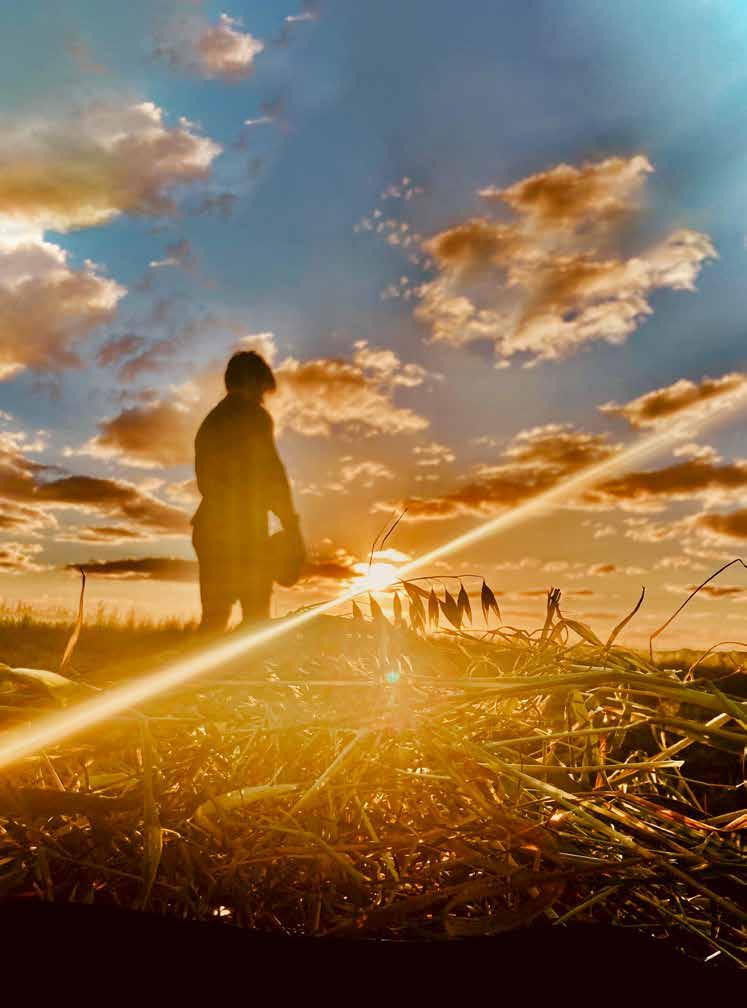




Edition 135 | May 2023
Cheers to 125 Years!
Inquiry
questions
The big step to Middle School
Clan is a periodic news pictorial for the Scotch College community.
Clan © Scotch College 2023

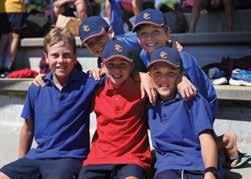

Editor: Geraldine Capogreco
Design: PaperScout


Cover Photo: Narrogin, taken by Henry Dyke (Student) for the 2022 Boarding Photography Competition
Running annually since 2008, the Photography Competition is a beloved representation of our roots in regional and remote areas and abroad.
Thanks to the boarders' photographic submissions, we are transported to unique places that are part of their family story, lifestyle, upbringing and culture.
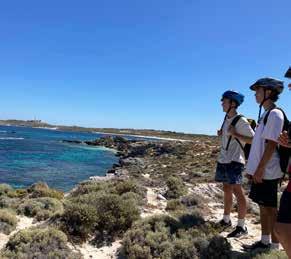

10 15
25
and reflection over life’s big
13
Look out for the 2024 Scotch College calendar to enjoy more striking images from this year's Boarding Photography Competition. time to connect and reflect on Rottnest Island
A
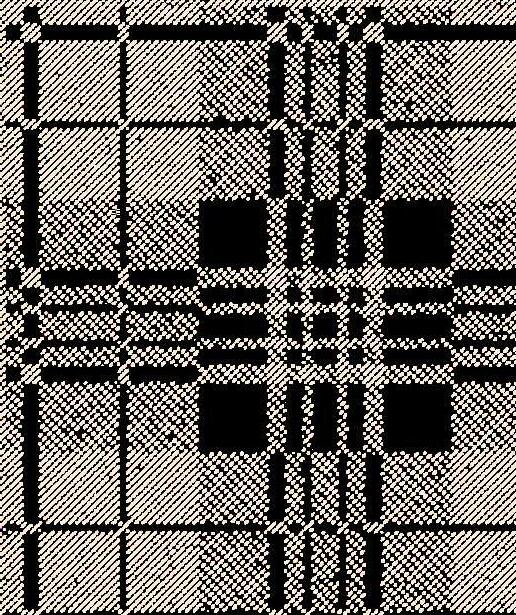
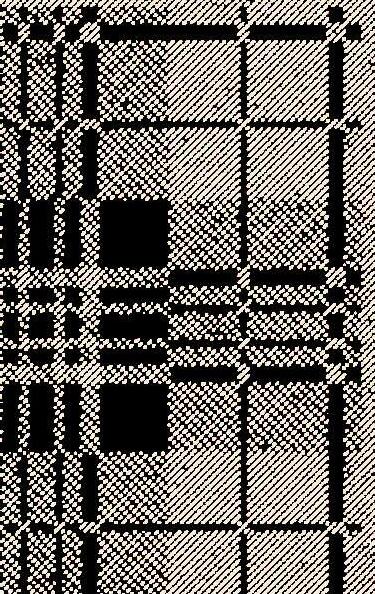
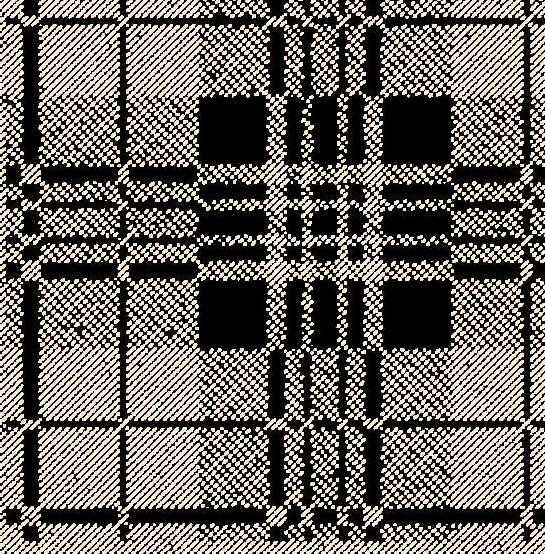
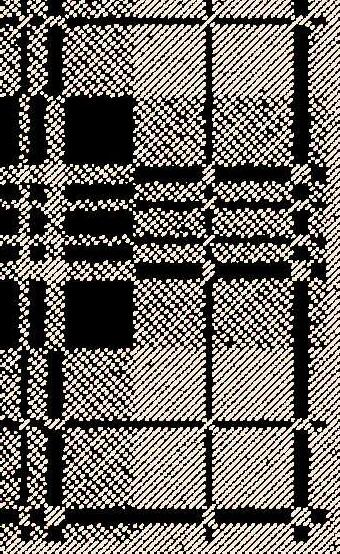



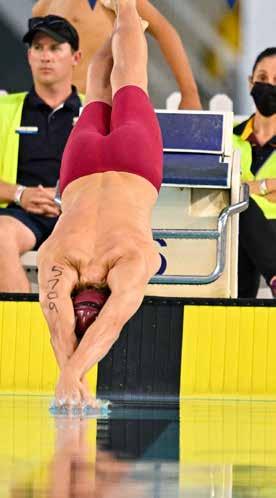
28 24 30 Headmaster 4 Chaplain 6 Council 7 Foundation 8 School Captain 9 Feature Event 10 Teaching and Learning 12 Teacher Feature 23 Pastoral Care 24 Service 28 The Arts 30 Sport 34 OSC 38 Archives 46 Philanthropy 49 Valuing the creative process Leadership through service Developing emotional intelligence In this issue 36
A 38 year victory for the Scotch Swim Team
Belonging
Dr Alec O’Connell
A local and global necessity
Over the 2022/2023 summer break, I was fortunate to be asked to present at the Round Schools Heads Symposium in London. While the topic is not what this article is about, the experience and context of my visit highlighted the importance of feeling like one belongs to somewhere or something, whether professionally, psychologically, or socially.
On the 17 February, The West Australian newspaper ran an article entitled ‘It’s the Great Brain Robbery’. For those old enough to remember Ronnie Biggs, the title is a clever play on another major UK event in the 60s. This article focused on the WA Government trying to attract UK citizens to leave their home in pursuit of money and lifestyle (code for sun). While it may work for some, country of origin, DNA and a person’s roots, still come into play when deciding to move. Why? because no matter the prevailing economic and lifestyle conditions,
one can never underestimate the strength of belonging for people. A sense of belonging grows even stronger the older one becomes, no matter how young a person may have been when they left their country of origin. In his 2021 book Belonging – The Ancient Code of Togetherness, Owen Eastwood highlights “we never want anybody to leave their culture at the door. To belong is to be seen and be respected for who you are.”
At the macro level, Scotch is part of two significant global organisations, the Round Square group of schools and the International Baccalaureate. These alliances are not driven solely by marketing, nor enrolment, nor to put a series of badges on our website. These alliances are driven by the desire to provide our students with a network centred on belonging beyond our boundaries on the global stage and with the goal of making our world a better place.
While at the Round Square Symposium I was very fortunate to hear Owen Eastwood speak first-hand about belonging and the impact his Māori heritage has had on his personal and professional formation. Owen’s work is focused on helping elite teams to engender a sense of belonging. From years of working with such teams he came to the following position, that is:
“Belonging is a wildly undervalued condition required for human performance.
When our need to belong in a team is met, our energy and focus pour into the team’s shared mission. We can lock into our role and the tasks we’re being asked to deliver. We are comfortable being vulnerable in our quest to get better. We feel secure enough to help others and point out where we could be better as a team.
We can be ourselves. We feel that we are respected and that we matter. We feel included. We can be a good teammate here. Our own identity, and that of the team happily coexist.
We are tuned into the legacy we are about to write. Whakapapa.”

Returning to why Scotch is part of the Round Square group of schools, the answer is simple. It is about helping our students develop a mindset which is character driven, thus providing experiential learning opportunities beyond academics and the classroom. It is about ensuring our students understand diversity in the real world, not just via academic constructs. Our students need to develop a strong sense of belonging in a world that has experienced a significant shift towards a context of polarised politics and ideologies based on fear and suspicion.
As a group of Round Square schools, we are colleagues, not competitors, and as such, our goal is to enhance us as a collective.
This very concept is captured in 1 Corinthians 12: 25 - 26 where it states “so that there should be no division in the body, but that its parts should have equal concern for each other. 26 If one part suffers, every part suffers with it; if one part is honoured, every part rejoices with it.”
There is a great saying that when the tide rises all boats follow. Individually, member schools do not have to prove they are better than each other, it is through sharing resources and experiences that membership of this organisation provides our students with a genuine opportunity to make the world a better place.
Belonging at the local level, in our context Scotch, is what really matters. Locally I hope that our students, their families and our OSCs experience a genuine sense of belonging.

As I said in the Feb 6 2023 edition of Thistle,
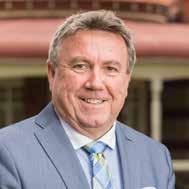
Headmaster
125th Cocktail Party Welcome to Country.
“I would like our Scotch community to experience a significant differentiator, that is, to experience the true meaning of belonging.

What do we mean by this? We sincerely hope that our boys and families experience a feeling of being happy, accepted, and welcome. Hopefully this will come from having positive interactions and relationship with those you meet, whether this be the teachers, admin and ancillary staff, fellow parents, Old Scotch Collegians, or any other member of the Scotch community.

In essence, a sense of belonging is one of humanity’s most basic needs and I hope this is experienced as being part of Scotch.”
From a historical perspective, during the time of hunters and gatherers, anyone who did not belong to a group or tribe, simply did not survive. Psychologist Abraham Maslow recognised this by placing belonging in his hierarchy of human needs.
At Scotch we must continue to remind ourselves that belonging is critical to everyone’s performance, that as members of our community, it is our role to tell stories about our identity and understand that belonging drives energy. We must be cognisant as to which things de-energise us and which things energise us. In essence, we must continue to focus on a seminal question, that is how do we create the best environment for everyone to thrive?
So, what does it mean to belong at Scotch? Belonging is our hope. Can we tell ‘the story of us?’ Do we know who we are and where we belong? The graduates we aspire to develop, must know the story of who we are, so that in turn, we can form who they become. It is not just about today. Remember that it is only last year that we celebrated 125 years since our commencement. We are simply a line of people who are connected to the past and move into the future. Eastwood shared a great analogy in that the sun will shine on you at some stage in your journey, but you need to capture and articulate how you got there and how the sun will shine on others in the future.
At Scotch we have already captured this in one of our three core values, ‘Stewardship.’ All of us must understand, especially myself as Headmaster, exactly what we are the guardian of now. What we do or do not do will be the legacy we leave. What we leave must create the conditions for the next generation, and in my case set the tone for the next leader of this community.
We must all decide on what chapter we want to write now, and what do we do to sustain connections with those who have already left our school. The former is an ongoing journey via our strategic focus and the resourcing of essential projects to ensure we continue to move forward. Any organisation that remains the same, is simply going backwards.
The latter is answered by our ongoing focus of engaging with the OSCs.
In 1972, George Seddon wrote Sense of Place, recording his experience and research into the Swan Coastal Plain. His work helped create a contemporary sense of place. To belong we must create a sense of place for ourselves and when our community experience a true ‘sense of place’ then our sense of belonging will be enhanced to the benefit of everyone.
Whether at the local or global level the importance of belonging is so succinctly captured by Hugh McKay in his 2021 book, The Kindness Revolution: How we can restore hope, rebuild trust and inspire optimism.
“We thrive on our sense of belonging to families, neighbourhoods and all kinds of groups and communities. We utterly depend upon our social connections for our emotional and physical security, for our sense of well-being, being accepted and taken seriously.”
At Scotch we must continue to create the environment and a community that encourages a sense of belonging. In turn a strong sense of belonging will contribute to three core elements which help us to grow and succeed, building and sustaining our College, setting clear directions for the future, and creating lifelong alignment.
March Out 2022. Reports 5
Chaplain Spirituality for all
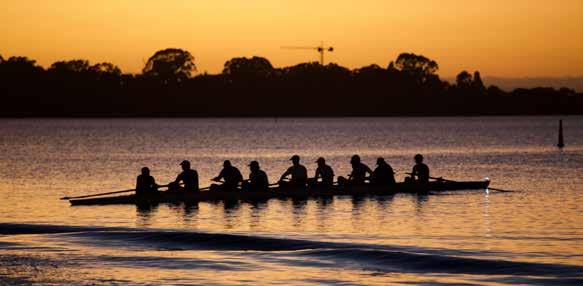
Revd Gary van Heerden

With religion in the western world in decline, it is worth revisiting our religious heritage here at Scotch. Established as a college of the Presbyterian Church (and then becoming a Uniting Church school when the Presbyterians, Methodists and Congregationalists merged in 1977), religious principles have always informed our endeavours, but the theology underpinning this religion is a robust, earthy spirituality. At the opening of our chapel in 1968, then chaplain Rev. EH Blackman referred to this spirituality as ‘a happy blend of the sacred and the secular’. Our brand of spirituality has always veered away from religiosity. Instead of teaching Religious Education as a timetabled subject, for example, we aim to take the traditional subject based RE construct and bring it to life through our Celtic DNA. Chapels, assemblies, ceremonies and service-learning activities provide the context for ‘religious education’. Tapping into our Celtic heritage will clarify this.
Johannes Scotus Eriugena (815-877), arguably the greatest Celtic theologian, taught that Christ moves among us in ‘two shoes’ as it were – one shoe being that of creation and the other that of scripture. Eriugena believed that God is in all things as everything is full of God’s essence. One is therefore just as likely to encounter God on an early morning beach walk, while enjoying a sunset, or jogging through Bold Park, as one is while praying or during a chapel service. This presence of God in everything undermines the distinction between ‘religious’ and ‘secular’ activities. Whatever we are engaged in, we are embraced on all sides by the divine Being. Long misunderstood, Eriugena’s theology was condemned as ‘pantheism’ (all is God), but is now celebrated for its ‘panentheist’ view of God’s nature (all in God), which goes far beyond mere ‘theism’ (God is up there, beyond all things down here), to affirm that God is both immanently within and transcendentally beyond all beings.
The decline of religion in the western world should not be interpreted as a decline in interest in spirituality. The burgeoning meditation, mindfulness and wellbeing fields are evidence to the contrary. Instead, the decline reflects a growing uninterested in outdated religious doctrines, dogmas, rituals and structures. Celtic spirituality offers a form of spirituality which is accessible to everyone.
The Celtic notion of a ‘thin place’ (a location or moment where the boundary between the physical world and the spiritual world is believed to be particularly thin or permeable) means that bumping into God is a daily possibility. In a world infused with God’s presence, nothing is too trivial to be sanctified by prayer and blessing. This sense of the importance of the little things parallels the Celts’ identification with the little people, the marginalised and the oppressed. The sanctity of ordinary, everyday tasks, meeting Christ in every person we bump into, enables us to encounter the Divine without being religious. As you face each new day, be as alert and attentive to Christ moving among us in creation, in those around us, as we are to the voice of God in Scripture.
Undermining the ‘religious/secular’ binary allows everyone access to a spirituality which can embrace life’s burdens and beautiful moments. As Chaplain, I search for new words, images and metaphors to deconstruct spirituality and to make it more accessible. Kirk@scotch is an initiative that seeks to make this spirituality available to the wider community. It is a 30-minute meditative service at 5pm on the first and third Saturday of every month in term time. Chants are led by choristers from Scotch and PLC. If you are interested and would like to experience a service with a difference, please join us. For more information, contact Rev Gary at gary.vanheerden@scotch.wa.edu.au
 Early morning training on the river.
Early morning training on the river.
Council Building on strong foundations
Mr Tim Wiese Chair of Council

A new year is a time for reflection, perhaps celebration and is often a time to pause and plan. It can be a time of renewal and change and optimism.
For Council, there has been significant change in its composition, with the retirement of long standing and much respected Chair of Council, Mr Mark Paganin. Mark served on Council for ten years, six of those as the Chair. His tenure oversaw significant developments in the Masterplan, with the construction of the Maths and Commerce building, and significant refurbishments to a number of heritage buildings including the Memorial Hall, Chapel, the Gooch Pavilion and the Boat Shed. He also had the unenviable challenge of leading through the COVID pandemic, which raised complexities on a daily basis during a period of great uncertainty for the school. I thank Mark for his diligent service for the school and Carissa and family for the support Mark received in the role.
We also farewelled Greg Ledger, Sachelle Blake, Terry Bowen and John Flecker, each a long serving member of Council. John remains in his role as Chair of Foundation. While these retirements represent a significant loss of expertise and corporate knowledge, a succession plan has been in place well in advance. Recent appointments ensure that a broad range of expertise has been retained on the board, providing seamless financial oversight and governance of the school.
I am pleased to welcome two new appointments to Council as announced at the Senior School Presentation Ceremony last year. Ben Bartholomaeus brings financial and legal acumen to the board from his career in Family Offices. Aaron Hood is stepping across from Foundation to Council. His corporate background ensures a wealth of financial knowledge and strategic ability. Both Ben and Aaron are Old Scotch Collegians and also current parents, so are well embedded in the greater Scotch community.
For me, it is a great privilege to be appointed as Chair of Council at Scotch. While the list of past Chairs includes many pillars of the Western Australian community, it is not the first time Council has chosen a farmer to serve in the position. I think this is a reflection of the inclusiveness and diversity that Scotch values and strives for, and also an indication of the College’s commitment to boarding and to providing a quality education for young men from regional and remote areas. Maintaining connections between city and country and an exchange of culture and knowledge between the metro and country lads are small but important elements of life at Scotch.

My awareness of Scotch started as a 10 year old, when my elder brother began as a Year 8 Keys House boarder. An empty room in the house and a smart kid not boosting the local High School. There can be some tough decisions made as a boarding parent. I followed two years later and my younger brother behind me. While a lot has changed in boarding, the close knit friendships that the boys forge remain a constant, and I value mine still.
My wife, Sarah, and I later re-engaged with the College, as parents putting two boys through boarding at Scotch, and a daughter through St Mary’s. I’m very aware of the financial commitment that parents make in sending their sons to Scotch, and thank them for it. As parents, we were able to appreciate the quality and dedication of the staff at Scotch; academic, extra-curricular, boarding, grounds and facilities, and catering, to name a few, in a way that I suspect I missed as a student. Now, with 6 years on Council, a broader picture emerges of the round the clock business that is Scotch. It’s busy, and complex, and it is staffed by some pretty extraordinary individuals. Traditions are valued and change is constant, fine tuning our offering to prepare our young men for a changing world.
Some significant changes for Council in 2023. What remains unchanged, is Council continuing to base its deliberations around the question of what is best for the boys. I wish staff and students all the best for 2023.
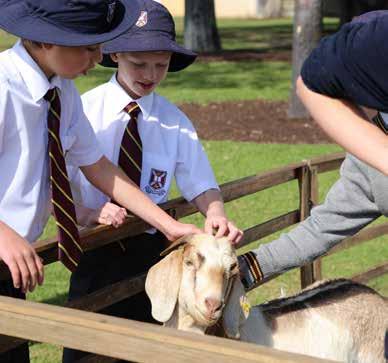
Reports 7
Students enjoying Ag Day.
Help us grow a community for all
Annual Appeal 2023


Today’s young people are imbued with the power to shape our future, and an enriching education is the most critical step.
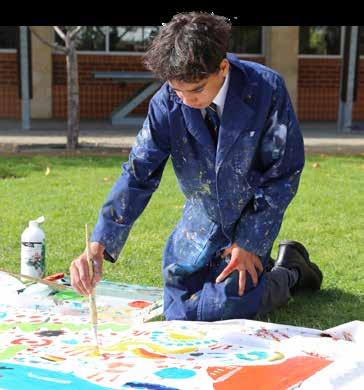
We need your support to continue providing life-changing opportunities to emerging Indigenous leaders of the future.
I want to give

scotch.wa.edu.au/giving


Building a strong community: unique and united
Marco Ghiselli
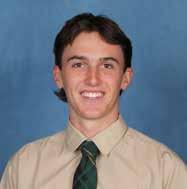
The start of this academic year, has been full of opportunities and new experiences for all students across the school.
As a College, we have wasted no time embracing the challenges that come with this new year. For the rest of the year we continue to strive to create a unique and united community that is inclusive, respectful and supportive.
To achieve this goal, we must work towards building a united school community. This means that we must all contribute to creating an environment of mutual respect and support, where everyone feels valued and included. We must be kind and empathetic towards
each other, and demonstrate a willingness to learn from each other’s experiences. We must also strive to create opportunities for students to engage with each other beyond the classroom, through extracurricular activities, sports, and events throughout the year. These activities help us forge strong bonds of friendship and understanding and allow us to develop important life skills such as teamwork, leadership, and resilience.
Summer sport has provided new opportunities for students across the years to come together and compete with the Scotch spirit and pride. We saw some outstanding achievements across all teams. Our success has come from our ability to work together and as mentioned, use everyone’s individual strengths.
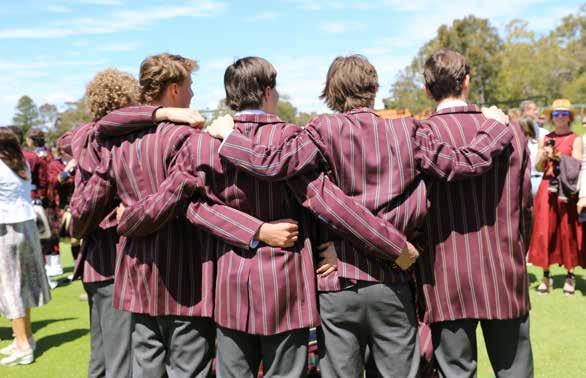
As we reflect on what has passed, we must also look towards the future. In this coming year, we have many more opportunities for the College to come together and build on the progress we have made, and remain committed to the principles of inclusivity, respect and support. We must continue to celebrate our uniqueness and use it to create a stronger, more united school community.
As we move into the Winter season of sport, I hope to see each team embrace the uniqueness of every individual, using each other’s strengths to come together to succeed. If, as a team or group, you think something cannot be achieved, just remember, anything is possible. Much like what the swimming team has shown this year, anything can be accomplished through hard work and team effort.
We must be kind and empathetic towards each other, and demonstrate a willingness to learn from each other’s experiences.
I urge all students to take an active role in creating a unique and united school community. We must all work towards being positive contributors to our school community and be committed to the principles of inclusivity, respect, and support.

School Captain
Reports 9
Cheers to 125 Years!
2022 was a year of celebration for Scotch College – 125 years since our school was founded and the 75th year since the Pipe Band was formed.


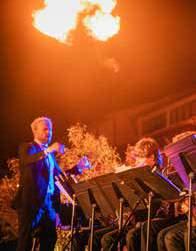
As with all significant milestones, it is important we come together to celebrate.

The 125th Anniversary Cocktail Party certainly gave the Scotch community an opportunity to celebrate in style as 650 guests gathered on the Senior School oval to celebrate this historic milestone.
Guests arrived to the warm welcome of a traditional smoking ceremony and a red carpet flanked by historic images of the College, past students, Headmasters and events that have marked the College’s journey from 1897 through to the present day.
Guests were welcomed with a South Beach aperitivo cocktail on arrival and the sounds of school ensembles, Figgy Tuna and 76 Shenton.

A cultural dance by Indigenous Student Programme Coordinator, Micheal Spratt and his family members, sand painting and Welcome to Country connected the guests to the traditional custodians of the lands and waters on which our College campuses stand, the Whadjuk Noongar people and Wilman Noongar people.
Headmaster, Dr Alec O’Connell and Chair of Council, Mark Paganin spoke about the significance of this milestone anniversary and how the College’s rich and diverse history and cultures brings us together as a community.
Thanks to our event sponsors, guests enjoyed local wines from Franklin Estate and Wise Winery and local craft beer from Gage Roads whilst our amazing catering team from Chartwells provided a delicious array of food. Thanks also to our Scotch Parents Community Choir, Scotch College Pipe Band A Team, the Scotch Jazz Big Band, and the Gallus Ceildih Band who provided endless entertainment throughout the night. To have so much home-grown talent within our student, staff and parent community made the evening even more special.
The highlight of the night was no doubt the finale as guests were treated to a Scotch College first; a combined performance of Bagpipes (played by Pipe Major Alex Pigneguy), the Didgeridoo (played by Micheal Spratt) and our Parents Community Choir. It created a unique musical medley and together with the projection of historic archival photos onto the Dickinson Centre and fireworks, this was a celebration to be remembered for a long time. So, cheers to 125 years!
Rachael Venn Event Coordinator
The Scotch Community celebrating the College’s 125th Anniversary.

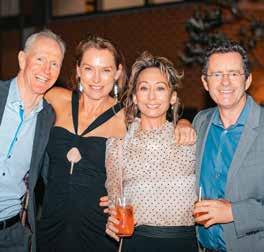
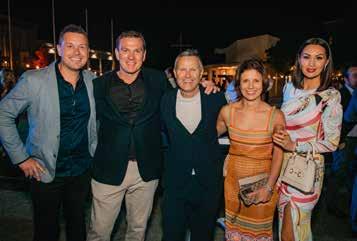
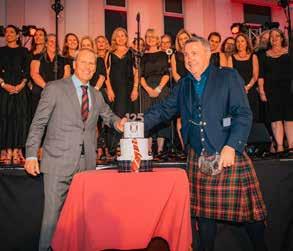


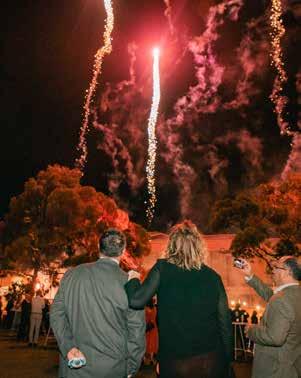


Features 11
Hybrid learning: the future of education?
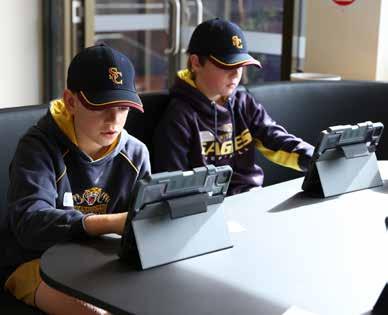 Mrs Cara Fugill Head
Mrs Cara Fugill Head
of Scotch Online

As students sit in their traditional 8:30 to 3:30 classrooms, taught within specific subjects and separated by age groups, they may begin to wonder why their parents seem to have more flexibility in their work routine postcovid than they do in their own education. The pandemic has taught us a lot about the value of remote work and the potential for technology to support it. More parents now have the option to work from home, travel less, integrate technology, and have greater flexibility in how they achieve their goals. But what about schools? Have they evolved in response to the pandemic, or have they returned to a traditional model, relieved that it’s all over? Are schools missing an opportunity to create a new structure that would offer older students more flexibility and make education more efficient? Interestingly, in the UK, Winchester, Cheltenham and Harrow schools have moved to online teaching to cater for their international market.

A recent study by Times Higher Education revealed that universities are choosing to keep the hybrid model of education rather than returning to full-time in-person teaching. 63% of participants stated that they preferred the hybrid model, even though 38% said that the quality of online teaching and resources during the pandemic was not up to their standards. This suggests that despite a poor experience with online learning, students see the potential for it to be a part of their future education. In fact, 76% of participants believe that the future of work will be hybrid in nature and see the benefit of preparing for this by learning in a similar way. Lastly the study concluded that the majority of participants believed that a balance of between 25% to 50% online would be ideal.
However, I don’t think the debate lies in the proportion of face-to-face versus online learning, but rather, what is being done with students during online learning? Is it simply a passive experience where students listen to pre-recorded lectures in the same non-
interactive way as in-person classes? If so, it is likely this generation of learners will be just as disengaged whether they are online or inperson. At least with online learning students can take a break to regain concentration or have the flexibility in when and where they listen. However, with the latest technology, surely, we can make online learning more interactive and engaging, allowing face-toface learning to be more social, exploratory and collaborative?
Education might benefit from providing teachers the time to design engaging online modules that allow students to think and interact with the material at their own pace. Technology is capable of assisting teachers to offer different levels of support based on student needs so they can cater to all learning styles and abilities with video, audio, questions, discussions, short answers, long answers, research, and more. All while building critical content that will give students the confidence to share their knowledge and collaborate during the social aspects of learning.
As a parent, have you ever been concerned that your child isn’t raising their hand or contributing in class? Have you ever asked why? The answer might surprise you. The social pressure and fear of potential embarrassment that this generation feels is not likely the result of getting a wrong answer
in front of their teacher, it is more likely the social commentary they fear from their peers. The increased exposure to social media and negative comments made online makes our young people hyper-aware of the criticism they may face if they don’t act or respond in a certain way. It is the teacher’s responsibility to create a safe learning environment where students feel confident and prepared to learn, however, the traditional structure is not assisting us to provide this as easily as before.
Education might benefit from providing teachers the time to design engaging online modules that allow students to think and interact with the material at their own pace.
Hybrid learning offers a unique opportunity for students to learn uninterrupted, at their own pace without social pressure. It builds independence and will likely model the future of university and workplace learning. There is a lot to think about in terms of how a school could prepare for this without compromising any aspect of academic and social emotional development so while we are still awhile off seeing these changes, it is not in the realm of impossibility that school timetables may in the future hold a more flexible structure as students get older.
Teaching and Learning
Inquiry and reflection over life’s big questions

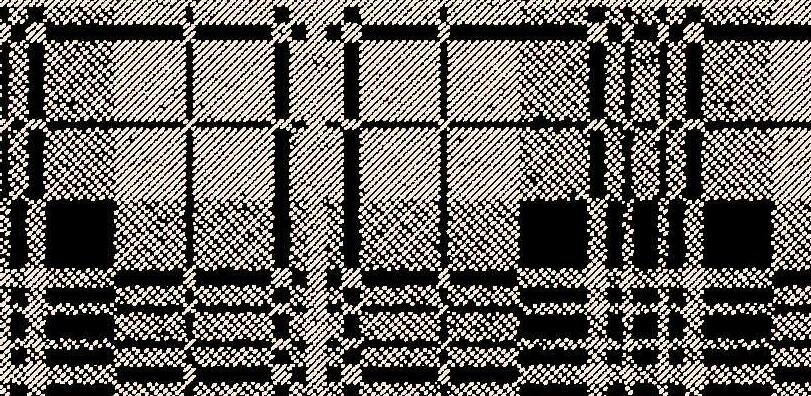 Mrs Racquel Cumming Kindergarten Teacher ELC Coordinator
Mrs Racquel Cumming Kindergarten Teacher ELC Coordinator
In the Early Years at Scotch College, we develop our holistic learning programme through the lens of the IB Primary Years Programme and the Early Years Learning Framework.

We use play as the vehicle to drive our co-constructed units of inquiry, ensuring the children’s wonderings and questions provide the springboard into our investigations. We encourage children to ask big questions and together create thought-provoking learning opportunities to explore the concepts behind these questions.
Some of the big questions we investigated during our ‘How the World Works’ unit of inquiry include, “How big is the ocean and when does it stop?”, “How do computers work?”, “How does the ice-skating place get the ice so big?”, “How did the dinosaurs die?” and “How do volcanoes explode?” For our young learners the focus isn’t necessarily finding the answers to their big questions, but gaining a greater understanding of the concepts which underpin each question, in an age-appropriate way. While exploring these concepts we are further developing each child’s language, physical, cognitive, and social/emotional skills. Our goal is to engage and motivate the children to think deeply and develop a strong desire to want to find out more about the world around them, while building their agency to design ways to get there.
During this inquiry, with such a range of big questions, we chose to spend two weeks investigating each topic. The children sought information through picture books and photos and explored concepts through guided and free play, manipulating a range of tools, resources, toys, and materials. We worked in collaboration with Mrs Clancy, our STEM teacher, to develop several child-initiated experiments and investigations such as forming and melting ice, erupting volcanoes,
and launching rockets. For some of these big questions we needed help from experts, so we reached out to our parents and local community and were excited to welcome Thomas’ dad to help us learn more about electrical engineering, Hugo’s grandpa to help us learn more about farm machines, and some of our wonderful facilities team to help with our woodworking skills.
At the end of the two-week mini-inquiry, we reflected on our learning through discussions, conversations and drawings, with each child sharing their new understanding of the big question as well as any further questions
the inquiry provoked. Parents reported their children were also sharing their new learning at home, so we invited our families to join us at Kindy for a Learning Journey. Here, each child enthusiastically walked their parents through photo displays of the inquiry and explained their new understanding of the big questions around ‘How the World Works’.
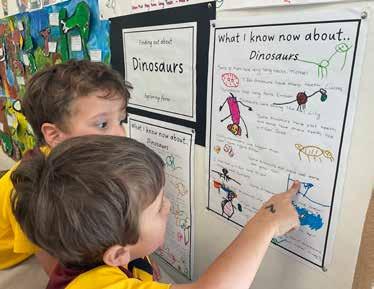 Top: Tom and Will Della Vedova reflecting on our class’s learning about dinosaurs.
Top: Tom and Will Della Vedova reflecting on our class’s learning about dinosaurs.
Teaching and Learning 13
Above: Neil Young, Hugo’s Grandad, explaining how our amazing facilities machines work.
From boyhood to adolescence: The Turas Programme
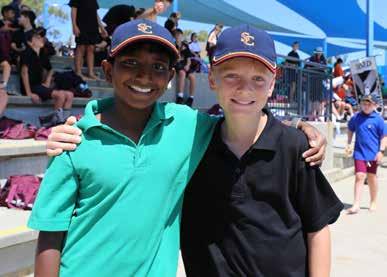 Mr Brad Gill Head of
Mr Brad Gill Head of
Middle School
Turas (Scottish Gaelic)

Origin & history
From Old Irish turus (“journey, visit; expedition; pilgrimage”).
For those who have attended one of my “Why Middle School” tours, my hope is that you may have left with two or three clear takeaways.
• Intentionality: There is intentionality in all that we do, from programme to facilities and everything in between.
• Joy: Students in middle school still require masterful educators who engage students in their learning and this, in my experience, is best achieved through creating joy in the learning process.
• Social and emotional development: The social and emotional development of students entrusted to our care is at least as important as their cognitive development AND, on occasion, even more important.
With these three key concepts in mind much time has been spent over the last 18 months developing our own unique approach to establishing our own significant point of difference.
This presents itself in the creation of the Turas Programme which intentionally delivers learning opportunities that enable our students to become the best version of themself, armed with the skills and processes that will best serve them as they step into the last four years of their secondary journey.
The Programme honours the age and stage of adolescent boys between 11 and 14 with learning experiences, resources and mentorship that will transition them from Junior School to Senior School, boyhood to adolescence, extrinsic to intrinsic motivation and dependence to independence.
Through Turas, we aim to develop students who can navigate a complex and
dynamic world with self-confidence and determination; embrace challenges with disciplined analysis and creativity; and engage others with empathy and integrity.
The Turas Programme prepares students for life by intentionally focusing on the development of:
• Character
• Integrity
• Emotional Intelligence
• Respect
• Relationships
• Wellbeing
• Gratitude, Empathy and Mindfulness
• Life Skills
• Leadership
• Resilience
• International Mindedness
• Community, Action, and Service
• Executive function

During the first term of our Turas Programme, Middle School students engaged in thoughtful activities that addressed two key areas; for the first half of term students worked on the theme of Positive Community, establishing growth goals and positive communication. Other key concepts were Social Connection, the Changing Brain, and Embracing JOMO (JOY of missing out).
During the latter part of the term the focus shifted to the notion of Best Self where students worked on establishing Self Belief,
Mindful Resilience, and an overarching Positive Outlook.
The rest of the year will see the boys focus on activities promoting Growth Mindset, Communication, Gratitude, Building Healthy Habits, Skills for Success, and Reflection and Transition.
I would like to thank the staff of the Middle School for their contributions to the creation of the Turas Programme but draw attention, specifically, to our Year Level Coordinators: Mr Michael Campbell, Mr Daniel Turco and Mr Kane Mitchell and our Deputy Head of Middle School – Pastoral Care, Mrs Giuseppina Giglia for their commitment to this task. In addition, I would like to personally thank Mr Justin Shaw, now Head of Student Leadership and Turas Programme Coordinator, who has led this initiative and deserves full credit for where we find ourselves today.
The Turas Programme is truly a unique framework which allows our students to develop as ethical, independent individuals who think critically and creatively, embrace diversity and develop into leaders and upstanders in communities. We hope parents will see the benefits of the Programme on the development of their boys and that our students enjoy the journey towards becoming the best version of themselves.
Aiden Kanagaratnam (Year 7) and Aleksa Pantelic (Year 7) at the Inter-House Swimming Carnival.
The big step to Middle School
The foosball table, where many friendships are forged.
Over the past term, 104 Year 6 students have taken the first steps of their Middle School journey.
This has included 29 new boys that have been warmly welcomed into the college.
Year 6 is a period of transition for the boys as they grow into adolescence. It is our hope that every student feels a sense of belonging and can thrive both academically and socially. So far the boys have enjoyed being part of a vibrant, safe, and caring environment that promotes academic excellence, socialemotional wellbeing, and independent thinking.
It certainly has been a busy start to the year for Year 6s where they have enjoyed connecting with their peers and with the larger world around them. Many were anxious as they joined from other schools or progressed from the Junior School but their enthusiastic approach to learning and caring natures have made the transition easier.
Mr Michael Campbell Year 6 Coordinator |Middle School Teacher
I’m a new student to Scotch College and the past few weeks have given me a great insight into the inner workings of the College. I have been able to experience my first JPSSA Sport season. I was quite nervous at first because I have never done JPSSA before and I thought that we were going to get decimated. However, we won our first game and that boosted my confidence and helped me make more friends. I went from being lonely with no friends to now having a couple of good friends and some great supportive teammates. The thing that most helped me settle in was touching base with some of my friends from previous schools who have been at Scotch for a while, and they guided me through my transition into the college and helped me fit in.
The thing I am enjoying the most would have to be Stem Design lessons because there is so much creative freedom and so many tools at your disposal.
James Nicholls
I was anxious at the start of the year and did not know what Middle School would be like. I met a bunch of new boys and I tried to make them comfortable at Scotch. I think there are a few differences between Junior School and Middle School. There is a lot more independence in Middle School because we are allowed to walk to classes by ourselves. There are also many more teachers. I have enjoyed the summer JPSSA season because I played competitive basketball with all my friends.
Ari Cole
On the first day of school, I was quite nervous. I had no friends at all. I really didn’t want to go. I walked into Scotch and when I arrived, I sat next to a nice boy. He said ‘Hello my name is Jack’. I said ‘Hi, I’m Ted’. He gave me a high five and I instantly felt more comfortable next to him. Throughout the term I have made so many more nice friends which feels amazing. At my old school we didn’t get provided with a lot of homework but at Scotch we do. I love it! It’s challenging and hard but also fun.
Ted Gilchrist
At the start of the year, I was excited as it was a massive step up from my previous school. It was filled with fantastic opportunities that no other schools could offer. I was also nervous however, I was pleasantly surprised to find out how many people I knew from Tennis and other clubs. I love the independent nature of Scotch and all of boys who attend it. The thing that helped me settle in the most were the teachers. They were very supportive and
helpful making it easy to work. All in all, I think that all the homework, technology and new things are just another step in my journey towards becoming a more independent and confident person.
Louis Collison
I have felt excited about my transition into Middle School as there are so many more things can do. For example, co-curricular clubs, different subjects, new technology and that doesn’t even scratch the surface. The thing that has helped me settle in was the foosball table in the Middle School Quad as so many Year 6s play there at recess and lunch. I mostly enjoy the Design subjects. Now I’m learning about woodwork and next term I will be switching so Food Design which is my personal favourite.
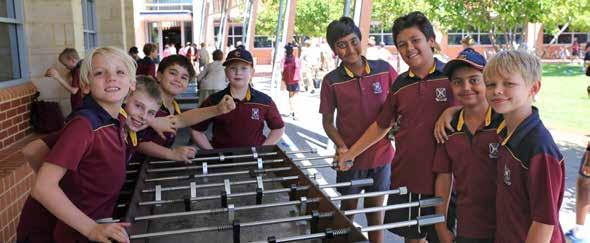 Thomas Gaitatzis
Thomas Gaitatzis
The past term has been very dynamic and busy. Lots of homework, travelling and packed schedules. This is my first year at Scotch. When I first started, I felt a bit nervous and anxious, but I soon started talking to a few of my classmates and now I have many friends. I think that the company of my friends and the comfortable environment gradually helped me become more confident. What I am most enjoying about Scotch is probably the Clubs on offer, JPPSA and the table tennis table outside. When I came to Scotch, there was a lot more homework and travel which makes it challenging, but I have learned to plan my day and now it is less stressful.
Eric Deng
Teaching and Learning 15
Insights into genetic research
25 Year 11 IB and 12 ATAR students visited the BioDiscovery Centre, a purpose-built facility to support the learning of biotech skills via real-world experience.
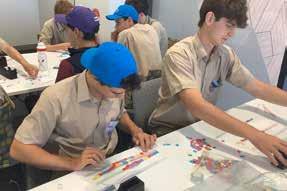
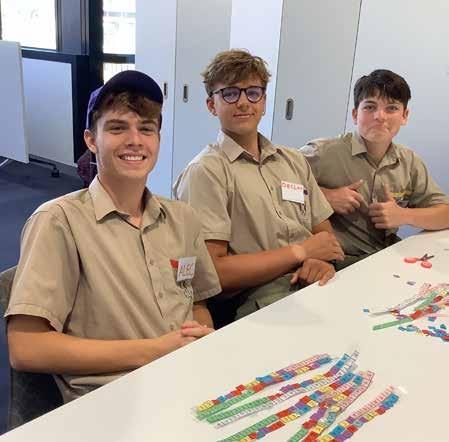

The purpose of the excursion was to give students a deeper understanding of how mutations can be identified through PCR, gel electrophoresis and sequencing in interactive wet and dry lab activities. This learning supports their understanding of the biotechnology studied as part of the Biology ATAR and IB curriculum. The tour was conducted by Masters and PhD students, who are currently doing research at the Harry Perkins Institute.
Year 12 student, Alec Aubé, takes us through the experience.
The tour began with an informative introductory presentation by the institute’s researchers. They introduced us to some of the methods they apply to detect genetic inferences of cancer such as carcinogens, which are most pertinent in causing cancer, and how to protect ourselves from common mutagens.
We were first introduced to the methodologies for detecting genetic indicators of cancer, specifically the melanoma variant, and then
taken through the process of how sampling DNA is replicated via artificial mitosis. The replicated DNA is then processed through a machine to detect any mutations. This indicates whether the individual whose DNA is being sampled is a suitable candidate for specific targeted treatment.
We were then tested on our active memory retention skills through a competition. We were split into groups of 2 or 3 and assigned the responsibility of performing a dry lab polymerase chain reaction using the four enzymes involved in replicating DNA: Taq polymerase, helicase, ligase, and primase. The groups were given simulated components of genetic information made of paper. However, the real challenge was having to create certain parts of the PCR cycle within a set time frame; the amount of DNA replicated doubled from each round.
The concepts of recent and upcoming developments regarding cancer research, one of many domains the Harry Perkins Institute applies itself to, were then illustrated to the group. The research in the field of cancer research is ever advancing, with treatment moving away from radiation, which has detrimental side effects. More recently, researchers across the globe are utilising methods such as CAR T-cell immunotherapy
that uses specially altered T-cells to target cancer cells site directly and precisely, as well as working on the development of new chemotherapy drugs to possibly remove the limitations of current targeted treatments.
We were first introduced to methodologies for detecting genetic indicators of cancer, specifically the melanoma variant, and then taken through the process of how sampling DNA is replicated via artificial mitosis.
The visit concluded with an informative tour of the institute. The volunteers guided us around the Institute, displaying the equipment utilised in the process of cancer detection, the costs leaving us in disbelief.
Overall, the visit enlightened us to the amazing advancements and lab work which is being made by researchers at the centre and world-wide.
Alec Aubé Year 12
Clockwise: Alec Aubé, Declan Chamberlain and Clement Hardie; Left to right: George Rowe, Aiden Marstrand, Alex Hudson and David Chen working in the lab; Giacomo Helliar and Charlie Hill working on DNA sequencing.
A deep dive into University learning with the Curtin Rising Scholars Program
Scotch College and Curtin University have been in a successful partnership since 2016, offering high-performing Year 10 students the chance to earn university credits while still in high school for no fee, through the Rising Scholars Program (RSP).
This innovative initiative provides students with a genuine online Curtin learning experience, enabling them to engage with university-level content, study with experienced lecturers and tutors, and interact with the wider Curtin community. Each student has the opportunity to engage with university-level content, and they are considered full Curtin University students.
In Semester 1, we have three exceptional students participating in the programme. Oscar Male, is studying The Foundation of Strategic Studies, Nicholas Lovegrove is studying Anthropology and Lachlan Dauth, who, after achieving some of the highest results of any student in Curtin’s Introduction to Programming course, has been invited to study more advanced software engineering.
Each student has the opportunity to engage with university-level content, and they are considered full Curtin University students.
The RSP aligns with one of Scotch College’s Enrichment Programme key pillars of ‘Independent work on areas of passion and interest,’ providing students with a unique opportunity to explore and deepen their understanding of subject areas of particular interest.
The RSP has seen over 20 Scotch students successfully complete a unit of study since the partnership began and look forward to seeing the continued success of the programme in the future.
 Sam Sterrett Head of Enrichment
Sam Sterrett Head of Enrichment
I am currently enrolled in the Curtin Rising Scholar Program, and I am excited to be taking my third unit, which is an introduction to software engineering. Throughout this course, I am learning about project management, and I have found the experience to be incredibly valuable. In addition to this course, I have completed two other units: introduction to programming and foundations of calculus. These courses have provided me with a strong foundation in the key concepts and skills that will apply to all my future learning. The whole experience of going to Curtin has been very useful. I have learnt many new skills and learnt a lot about how to manage my own workload as the lectures don’t micro-manage us to make sure we get the work done which was a big change from classes at Scotch and did make staying on top of my work a challenge at the start.
Lachie Dauth Year 10



I am studying an undergraduate unit in the Foundation of Strategic Studies. Although it may sound a little ambiguous it is in fact a rather specific course. The unit involves a deep dive into defence and the role that war plays in geo-politics. The content, such as learning about the Russo-Ukraine war or how nuclear warfare plays a role in our political landscape, is very interesting and incredibly prevalent in today’s world. Although it seemed incredibly challenging at first, it does feel like I am getting the hang of universitystyle education. It is very interesting how much experience some of the lecturers have and fun to be able to think critically about subjects with real-world importance. It might be a little challenging being younger than everyone else but that’s also half the fun!
Oscar Male Year 10
I am enrolled in the Curtin Rising Scholar Program studying Anthropology. Anthropology is the study of society, and humanity, and is extremely important in understanding why we act the way we do. I am currently studying the way society is structured. This means looking at the way the economy and ‘superstructures’ such as the government, religion, family, and other concepts interact. The most interesting concept that I have learnt so far is the idea that you cannot understand society by looking at the individual. Society is the emergent behaviour of many individuals and thus we must look beyond our narrow points of view to better understand how we interact with society. I really enjoy the deep dive style of education that university offers, but I find it very different and more difficult than school (of course!); but then again, I can’t wait to learn more.
 Nicholas Lovegrove Year 10
Nicholas Lovegrove Year 10
Teaching and Learning 17
Challenging students through the Enrichment Programme
The Enrichment Programme provides our most academically able students with rich, challenging, learning opportunities beyond the mainstream curriculum.
The programme is designed to offer depth and breadth of opportunity in support of a student’s intellectual, social, and emotional growth.
Junior School Maths Enrichment

In line with one of the five principles underpinning the College’s Enrichment Programme for our most academically able students, ‘daily challenge and talent development’, three exceptional Year 5 Junior School mathematicians had the fortune of working with OSC, Lewis Orr. Lewis is currently studying pure Mathematics and the Classics at UWA and kindly offered his time to introduce the boys to a number of advanced maths concepts.
Sam Sterrett Head of Enrichment
The programme is characterised by unique and exciting collaborations between our sub-schools and cross-campus collaboration with Presbyterian Ladies’ College. Opportunities include clubs, broadening initiatives, competitions, and tailored outreach programmes with our partners in industry and academia. These programmes
support boys of high ability to realise their potential and harness their many talents towards making a positive contribution to the global community.
We take a look at some of the activities that boys across Junior, Middle and Senior School have undertaken this term.
From the advanced maths sessions with OSC Lewis Orr, I learned algebra, which is the study of variables and the rules for manipulating these variables in formulae. It includes numbers, constants, variables, expressions, equations, and linear equations. I also learned that whatever you do on one side of the equals sign, you must do on the others side as the equation has to be balanced.

I really enjoyed working with Lewis because he showed us lots of great websites and how to
Australian Computational and Linguistics Olympiad
The Australian Computational and Linguistics Olympiad (OzCLO) is a contest about language and problem solving for high school students. Teams of four work together to answer and decode challenging questions about languages from all over the world. An example of a problem we’ve been faced with is getting limited hints and translations and having to decode a series of messages in Mambiloid, a language spoken by tribes in eastern Nigeria.

I have found it very interesting to explore the different ways languages and words are formed in different parts of the world. Time management is a big part of the challenge as we have five very complex questions to finish and must be very efficient across the whole 2 hours to solve the problem.
I enjoy the stimulating mental challenges of working through the questions as well as working together with a great group of boys.
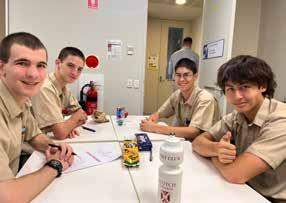 Tom Jackson Year 12
Tom Jackson Year 12
play with algebraic sums. It was challenging too because Lewis made us think about why the answers are the way they are. He helped me to learn more about algebra and the missing numbers. Lewis made it fun by giving examples that made me imagine numbers with jetpacks and cool shoes. It helped me remember them and visualise them.
Dylan Vytialingam Year 5
Enrichment
Year 5s Rupert Green, Dylan Vytialingam and Chris Wang with Lewis Orr.
Year 12 OzClo finalists Jason Pocock, Tom Jackson, Nacho Astorga Villanueva, Andrew Walker.
Talented Young Writers’ Programme
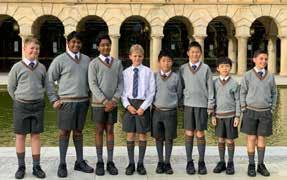
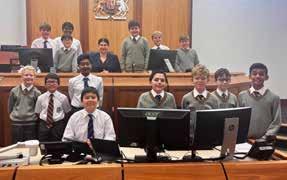
The Talented Young Writers’ Programme brings authors living in Australia to The Literature Centre, located in the Old Prison Hospital in Fremantle. The programme allows students to learn about the story writing process and explore what it is like to be an author. In this term’s workshop, the author Barry Jonsberg taught us all about the editing process and how authors don’t come up with stories, but rather discover them. Barry made each part of the process simple to comprehend and we had the opportunity to ask many questions about writing.
Cluedunnit




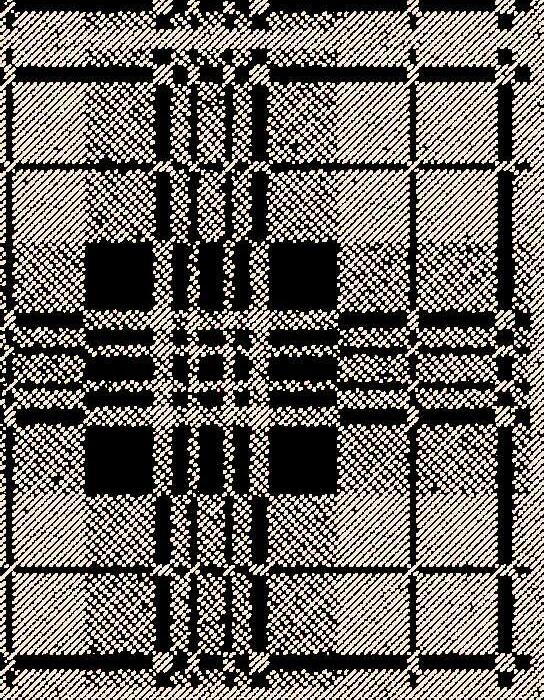

The WA Law Society’s Cluedunnit is an enrichment opportunity unlike any other. It provides the participants with valuable knowledge and an insight into what a legal career might entail. In Cluedunnit the teams must sentence 2-3 of the main suspects (including the prime suspect) to an appropriate penalty. To do this they will have to look through the brief of evidence and then pose 6 questions to the Law Society, seeking extra evidence to prove their suspicions beyond reasonable doubt.
After that comes the most exciting part of Cluedunnit, which is the creative presentation. Teams create a media presentation of their legal arguments in a fun and original way. This could be a comic book, video or even a combination of the two.
The thing that I enjoyed the most about this competition was the filming and editing of our creative presentation. It was very funny to go through all the retakes and then come up with our final edit.
Montgomery King Year 6
During the workshop, we also worked on finding a story, writing, rewriting and then editing it. We took part in interactive group activities where students from different schools paired up and collaborated by sharing their own short creative stories, offering feedback and advice. It was an enriching experience made fun and engaging by Barry’s sense of humour. We look forward to next term.
Heath Arbuckle and Alexander Donald Year 10
The Da Vinci Decathlon
The Da Vinci Decathlon is an academic competition held annually for students in years five to eleven, at UWA. There are eight students in a team per year from a school attending the competition. The Decathlon is named after Leonardo Da Vinci who was one of the greatest luminaries in all of the ten Decathlon subjects: Mathematics, English, Science, Art & Poetry, Engineering, Cartography, Code-Breaking, Legacy, Ideation and Creative Producers. Legacy tests general knowledge on famous people and their significant inventions. Ideation is about coming up with creative solutions to real-world problems. Creative Producers is about creating a skit from a given prompt. Teams prepare by testing themselves on old papers to prepare for the upcoming ones. My takeaway from the Da Vinci Decathlon is that it helps students develop collaborative and problem-solving skills as well as resilience.
Ahren Mahesh Year 6
The Young Entrepreneurs Showcase
Last year, Scotch College gave me the opportunity to take part in the Young Entrepreneurs Showcase (YES) event at West Tech Fest, where I presented and pitched my new technology start-up, Droneify, to potential investors and clients. The event was packed with insightful experiences, from having the opportunity to pitch my business to influential technology entrepreneurs to meeting the creator of ‘Angry Birds’! This STEM enrichment activity truly gave me invaluable insights into everything that goes into preparing for a business tradeshow, from creating business pamphlets, to developing an exciting promotional video. The YES event also gave me the opportunity to speak with students from across Perth that share my passion for business, technology, and entrepreneurship. It was great to hear about the different experiences, challenges, and successes of young entrepreneurs in Perth. Overall, this STEM enrichment experience augmented my understanding of how tradeshows operate, fine-tuned my pitching techniques to investors and revealed the secrets of Angry Birds’ mega-success!
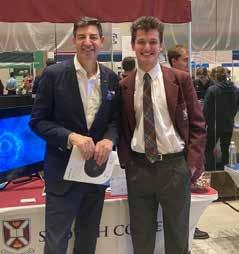 Ethan Buzza Year 11
Ethan Buzza with Perth Mayor Basil Zempilas at The Young Entrepreneurs Showcase.
Ethan Buzza Year 11
Ethan Buzza with Perth Mayor Basil Zempilas at The Young Entrepreneurs Showcase.
Teaching and Learning 19
The Scotch team with Justice Larissa Strk. The Scotch Da Vinci Decathlon team at UWA.
The first archived edition of the Scotch College creative writing magazine
The Raven appeared in 1992, and the last hardcopy edition was published in 2009.
The magazine’s intention was to celebrate original creative work by Scotch College boys. In 2014 The Raven was resurrected in a new electronic form. Each term there is a new edition. Included in each edition is a collection of meritous writing and works of visual art. Since 2021 there has been both a Senior School and a Middle School edition. Some OSCs have sent their writing for publication also.


So, Primary, Middle and Senior School students, if you have some good creative writing (with a maximum word limit of 1,000 words), send it to Dr Weeda on jeannette.weeda @scotch.wa.edu.au. It will be edited and then there’s a good chance that it will be uploaded to The Raven. All entries go in the running for the various Reporter prizes.
Harry Burbury
Year 12
Creative writing Bitter Sweet
Run! Run! Get there! He feels his lungs hurt as he gasps for air. It’s hot, dry, dusty. He sprints, willing himself on. Tired legs scream. He ignores them. Must keep going. His hand touches leather. Not even a hand, a finger. Then he slams into something solid, unmoving. He’s knocked to the ground, hard. He tries to breathe but the shallow, short breaths give him no respite. He groans and rolls over, looking up at the bright blue sky. It’s an endless blue dome, unbroken by clouds. The scorching sun’s rays burn down on him. He closes his eyes, takes stock of his injuries. Nothing that can’t be pushed down, saved for later when he has time to recover. He hears the loud screech of rainbow lorikeets, squabbling over nectar in the bottlebrush nearby. The deafening drone of cicadas calling for a mate. He feels a hand on his shoulder. Someone pulls him to his feet. He wipes the dirt from his eyes. Spits out the grit. Takes another breath. Gathers himself and pushes on.
He loves this game. Loves the thrill of the chase, the contest for the ball. Arms pumping and legs flying behind him as he races across the paddock, the kind of freedom you only feel in dreams. His father played this game. Taught him how to handball. Showed him how to take an overhead mark and kick a torpie. Taught him what it meant to be in a team. To be part of something bigger than yourself. Playing a role and working towards a common objective.
It’s a physical game, full of hip and shoulders, pushes in the back. There are elbows crushing ribs and bone-jarring tackles. He endures all this, welcomes it almost. It’s part of the game.
He squints in the midday sun and sees the yellow ball soaring in the blue sky. He watches it float over his head. He turns and chases it. It was just him and the ball. Until it wasn’t. He feels a presence. A dark shadow advancing. He tries to avoid the inevitable collision. Too late. Crunch. He feels the baked earth beneath him. Not much grass really. He’s dazed and he shakes his head to clear his vision, still lying flat on his back and clutching his ribs. Everywhere aches. He tries to move, but can’t. The umpire’s shrill whistle cuts through the ringing in his ear like a squawking canary, awarding him a free kick. He climbs to his knees, deprived of oxygen. Finally, up to his feet. He takes the ball and walks back off his mark. Turns around. The siren sounds. Silence. His heartbeat echoes in his ears. The ball beneath his fingers. He looks toward the goals. Then he hears it.

Those words. Those same familiar words that have haunted him throughout his life. You never get used to them. Like gut punches each one. Never build up a tolerance. Only words, people say. Names can never hurt you. And yet, what is this feeling if not pain? This feeling that you are somehow less of a person. Inadequate. Part of a team but never fully accepted. Words that are thrown about carelessly, thoughtlessly. Said without considering the hurt caused. Or then again, perhaps that was their intention all along. He takes three deep, shaky breaths, trying to push these words out of his focus. He walks, then jogs and drops the ball on his left boot towards the four tall sticks. His kick is off, across the face. He drops his head. Smirks are seen and jeers are heard, humiliation felt deeply burning in the pit of his stomach. Failure.
Three quarter time. In the huddle. He watches the coach’s mouth move as he delivers his speech. Sees his eyes blaze and his spit flying. Barking orders and offering encouragement. He hears none of it. Shame eats away at him. Why is he even here? He feels unworthy. His head is full of doubt. When will he be seen as an equal? When will he be seen for who he is? He feels his passion for the game diminishing. He hears his voice in the smattering of people along the boundary, he locks eyes with his father. Was there a small nod? Deep eyes, old beyond his years. A look passes between. An unspoken understanding. Old as time. A shared pain. A connection. A belonging. An understanding. Family. A swell of emotion like a tsunami hits. It’s almost physical.
The game continues, final quarter. He feels his heart quicken as the whistle blows. He loves this game, the great outdoors, the bright blue ceiling. The red dirt in his boots. The deep ache of his muscles as he pushes his body to the edge. The exhaustion and exhilaration in equal measures. He breathes in deeply, tasting the heat. Feeling the dampness of his jumper sticking to his back. The umpire bounces the canary yellow ball in the centre… He is ready.
The Catacombs
James Caporn Year 12
I wandered through the sanctioned corridors, sensing the shelves close in around me, forming walls, a dark, black tunnel, suffocating me with the dust and dirt in the air I could all too well see, coating all surfaces in a thick layer of black grime. The sense of decay here was ever-present. Looking at all the dust and dirt particles floating in front of me, they seemed to never settle, or even move, as if they have remained in stasis. Forever.
“Hello?” I exclaimed, hoping for even the slightest response from someone. Anyone. But all I heard was my voice reverberating off the walls, and then an eerie silence, complemented by the sharp and cold gusts of wind that echoed throughout the aisles, and the silent creaking of the shelves around me, all housing something shrouded in dust. A few minutes later, however, I started to hear a noise. It sounded quiet and human in nature. Curious, I started towards this noise, making sure to avoid what seemed like rubble littered all over the floor, impeding my path.
Eventually, I found the source of the noise. It looked like a human, quietly reading something in a monotone voice, as if it didn’t want to disturb anything around it. I quickly sneaked to a shelf nearby to observe this interesting character. Despite the darkness, I managed to see the titles of the books that it had read, works such as The Communist Manifesto and The Complete Works of William Shakespeare. I counted myself lucky that I could make that out, as there were few people left who could still read. These books were all tossed onto the ground, left to be consumed by the darkness and forgotten. I listened for a while and heard the distorted THUD that was accentuated and echoed by the vastness of this labyrinth every time this figure tossed a book onto the floor after reading it, like clockwork, and the silent outcry of the shelves at every book taken from them.
Suddenly, I saw a book come screaming towards my face. BAM. “Ow!” I screamed, my nose now bleeding profusely, dripping red blood everywhere, even onto the books, not that it made any difference to the state that they were in anyway. I realised that I had been discovered. The figure knew I was here, and instead of turning its body to face me, it instead turned just its head, extremely slowly, as if it was on a swivel, revealing a crooked smile, warped after years of disuse. Its malevolent red eyes glared into my soul, lighting up the black shelves with a sickly red glow.
“Hello- may I- service today?” A distorted, crackling noise emerged from the figure. In shock, I stumbled back, accidentally knocking over what felt like dry small skulls from the shelves, making loud hollow clunking sounds as they thudded onto the floor, devoid of all life. It was trying to be friendly, but failing miserably. It must not have had much human interaction. The figure seemed to be staring at me. Unmoving.
“Who-What are you?” I asked, startled. I was met with an uncomforting, deafening silence. Despite the figure’s creepily nonchalant demeanour, accompanied with its inhuman posture and glowing red eyes that tracked me, I cautiously reached out. I felt the cold touch of steel and the rough feeling of rust. It was evident that this was a machine that has stood the test of time, like everything else in this place, and firmly attached to what seemed like a small, rusted railroad that snaked around the shelves, leaving this robot bound in the confines of this labyrinth. The robot seemed to be an old, antique model of the TX8100 with a rusted arm, and the other one missing with a tangled mess of wires hanging out in its place. Little was known about the TX8100. It seemed to be a lone sentry patrolling something that was forgotten long ago.
“Hello? What are you doing here?” I asked, backing away behind a shelf, guaranteeing to not get hit by another book to the face.
“Hell- I am th- TX8100. I wa- designated he- to protec- and safeguard this plac-.” The robot replied disjointedly, as it slowly adjusted its head and body to a human-like composure.
I thought humorously to myself how hypocritical that statement was, and how the robot casually threw these books away to rot on the floor with the dust and dirt without a care in the world. It had clearly been warped throughout time. What I found even more curious, however, was that the meta-net said that this was an ancient catacomb, but there were books here, and a robot too. Kneeling, I picked up what seemed like a dry foxed manuscript, with uncut, unopened edges, that seemed to have been marinating in this decay for eternity. It had the title The Canterbury Tales. Being a historian, I would have thought that I knew what this book was, but I did not. Perplexed, I put the manuscript back in its rightful place on the shelves. Although I heard nothing, I almost felt a chorus of approval resound from the shelves around me.
“Hey, robot, I seem to have lost my way. Do you by chance know the way out of this maze?” I asked, not at all expecting a valid reply due to the condition it was in. The robot’s eyes rekindled, as if it finally had a purpose. “Yes, I kno- a way. Follo- me please.”
Unexpectedly overjoyed with the robot’s promising reply, I followed it for what seemed like hours in this dark maze, as it smoothly snaked throughout the shelves with a natural demeanour, as if it knew this place like the back of its hand, if it had one that is, with each corridor, shelf and book looking identical to the last, unchanged. Finally, I reached the exit, which was a small staircase, leading to the surface. As I left, I saw a small, rusted sign inscribed with the word “Library”, and I suddenly realised what this place must have been. I thanked the robot which was still finding refuge in the darkness, avoiding the light, and I told myself from that day on that I would never return. Some things left in the past are better left forgotten, as humanity steels itself for the future. Besides, I didn’t want to get another book hurled at me.
Teaching and Learning 21
Inches from Glory
Harrison Hill
Year
10
Bat, ball, stumps… let’s go! I walk down the steep, rocky hill leading down from our rusty but sturdy 1950s holiday shack in Augusta. My periphery catches one of my mates, fiery Tom, the fierce but inconsistent fast bowler from North Fremantle. If I had to compare him to a current Aussie bowler, he would be the Pat Cummins of the team, although maybe a bit more intense. On the other side of me, striding purposefully down the hill, is the young and upcoming deadly spin bowler, Nifty Nico from Swanbourne. I would describe him as a Shane Warne but with less of his repertoire. The sheer confidence and trash talk emanating from these two lads suggests that I am up for a very competitive game of backyard cricket.
As I take my first steps on the recently mowed, home-grown pitch, full of bamboozling lumps, bumps and holes the size of craters, the brisk sea breeze sweeps up my back causing back tingles and finger twinkles.
New Danger
Richard Gamble
Year 10
Social, a human behaviour
Media, a global conversation
So why through this never-ending spiral Do we want everything we have and know to go viral?
From cat videos to sport fails to singles only a kilometre away We dedicate our lives to this spotlight Wasting away the Day.
Book with a face instant gram now I have a weird ad wonder if it’s a scam.
I realise my time has come as I take guard and stare straight into Tom’s intense eyes charging down the pitch towards me. Added to this, I can hear Nifty’s aggressive whispers from behind the stumps … “Oh Harry don’t get out … You’re gone. No big score for you today mate!” he chuckles.
“Just get the job done,” I say to myself while I raise my bat, gripping the handle as tightly as I can.
“Ooooh!” shouts Nico as the first delivery whizzes straight past leg stump.
“Thankfully, not another golden duck,” as I remember last night’s poor performance.
“You got lucky there, Haz,” said Nico from behind the stumps.
“Harry, you’re meant to hit the ball not the air,” shouts Tom as he returns to his mark.
The pressure and trash talk are really getting into my head now and the goose bumps and sweaty palms are building. I grit my teeth and give myself a motivational couple of words as Tom starts his extra-long run up, “Come on Harry, Come on!”.
“Oh, Ahh, howzat!” shout Nico and Tom as the next couple of deliveries narrowly miss the stumps. I try to calm my nerves, telling myself to re-focus.
“Bang! That’s the one!” I celebrate as the ball sails over the fence for six. Bang, Bang, Bang! I am on a roll now with a couple of fours added to the tally. It is a decent start but from previous games with Fiery and Nifty I know I need a few more boundaries to be in a strong position.
Nico charges in for his first bowl of the day. The ball is fizzing and swinging into my leg stump as the sea breeze hits it. I wind up to smash it for six as the ball hits one of the many divots in the pitch and finds its way to middle stump. I stand frozen in my defeated stance. I can’t believe it. I stare helplessly at the bails lying uncomfortably on the ground. I look up to see Nico and Tom celebrating like there was no tomorrow.
I take a deep breath and realise that I now must bowl and wicket keep like Dennis Lillee and Adam Gilchrist.
It’s game on!
Blissed Out
Tommy Clements
Year 10
Now it’s live from across the globe testing our patience just like a probe. to the dark web and new different disguise I’m a new person Humanity slowly dies.
Social Media
Never ending spiral So why does everything Have to go viral?
The sun shines dimly, Peering at the world below, Golden rays reach out through the clouds, Like God has touched the Earth. Sunlight reflects off the glassy river, A warm breeze glides over my face. A swan drifts past, Nesting on the rocks. The winding of a fishing rod, The hum of two parents chatting, The smell of fish and chips, The whirr of a bike passing, The touch of the cool jetty, The speaker plays music, Friends sharing stories, Telling jokes, Laughter. On the safety of her beach towel, Dolphins splash as, The sky flashes orange, Illuminating the clouds, She glows in the dimming light, We watch the sunset. Kids shout and play, This is the end to the perfect day, Bliss.
The world is a such beautiful place, I wonder when the grin will leave my face.
“Just get the job done,” I say to myself while I raise my bat, gripping the handle as tightly as I can.
TEACHER FEATURE
Micheal, tell us about your journey to now. Where did it all begin and what were the milestones along the way?
I attended a primary school in the suburbs before studying at Wesley College until I graduated in 2014. Things clicked for me in high school, and it was a big step in becoming a young man, building confidence and discovering my identity. After graduating, I spent a gap year living in the UK. There I developed independence and learned what it was like to struggle and thrive. After my gap year, I returned to Wesley to work with their Indigenous students for five years. During that time, I grew and learned more about my culture and how to teach and share it. Some of the highlights along the way have been travelling to New York to attend the World Indigenous Peoples’ Conference on Education and showcase my culture to Indigenous people from around the world, speaking and performing with Midnight Oil for Telethon, opening for the first West Coast Eagles match at Optus Stadium and performing at the AFL Indigenous Round in Perth.
You’re Scotch College’s Indigenous Student Programme Coordinator. What does a day in the life of your role look like?
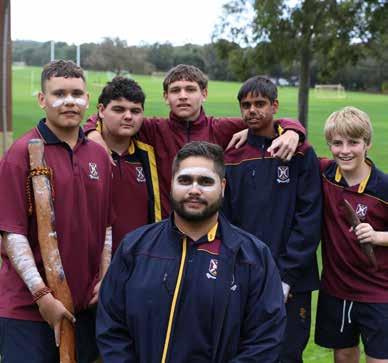
My role is to academically or culturally support Indigenous students here at Scotch. I bring knowledge about Indigenous culture and history to our staff and classrooms. I consider myself a consultant for teachers wanting to learn more or find resources to enrich their lessons. On top of this, I constantly work to grow the Indigenous Programme and help our Indigenous students to continue learning and practising their cultures.
What is the Indigenous Programme all about?
At its core, it’s about helping our students to uncover and build a strong sense of identity. Growing up, I never had an opportunity to learn about my culture or have someone teach me about it until I was older. Culture is vital to who we are, particularly in those formative years, which is why I do what I do. In my role, I support our young boys to grow into people who are strong, proud of their cultures and equipped to do great things for themselves and others.

Get to know
Micheal Spratt
Indigenous Student Programme Coordinator
If you could give one piece of advice to the students in the Programme, what would it be?
One of the things I often mention to our students is to take advantage of opportunities. Coming to a school like Scotch offers opportunities that might not be available elsewhere. Many of our students have yet to discover what journey they want to take after school, and I encourage them to take advantage of these opportunities and try new things to learn more about themselves. My goal is for our students to thrive in cultures that are different to theirs and to share their own culture with others, and participating in a range of activities at school is one way of achieving this.
What’s next for you and the Indigenous Programme?
The future of the Indigenous Programme is very exciting. Our students are highly involved and are encouraged to voice what they want to see in the Programme. We’ve started planning ideas for NAIDOC Week later in the year. Aside from that, we are looking at ways to integrate aspects of Indigenous culture with parts of Scottish life. Hint, hint: stay tuned for collaborations between the Pipe Band and the Indigenous Programme. The Programme constantly evolves and responds to what our students want to learn, so we’re having fun and enjoying the journey.
Micheal Spratt and some of the boys from the Indigenous Programme.
Teacher Feature 23
Developing emotional intelligence
Mr James Hindle Director of Pastoral Care
There are two skill sets that have always been crucial to the successful functioning of society, and I believe that these will need to be enhanced during this current wave of technological change: one is our capacity to think critically; that is, to be able to challenge and question respectfully, to find and assess the value of information, and to construct and deliver a logical argument. The other is to develop greater levels of emotional intelligence; that is, to be able to recognise, express and manage emotions in ourselves and others. Together, these two provide a template by which we can enable younger people to build a better world, or at least to prepare them for a future when we do not really know what that future will look like.
Emotional intelligence is something which we can strengthen by consciously and regularly training. Often, much of our learning is subconscious, but people learn about
themselves and others in every interaction; this emotional learning gets added to our memory. How well we relate to others, how well we understand ourselves and what motivates and upsets us, whether we have empathy for others – these are skills which are becoming increasingly important as young people spend more time on devices. There is evidence to suggest that it is harder to recognise facial expressions and read emotions on screens. It is even harder to pick up emotional cues through texts.
This year, we have partnered with Swinburne University to begin the implementation of their Aristotle (EI) Emotional Intelligence programme. This has begun in Junior School and we are also using parts of the curriculum in the new Middle School Turas programme. It also forms part of the Year 9 Wellbeing course and I include elements in our Wellbeing sessions at the Year 9 Rottnest camp.
We speak regularly with the boys about the importance of recognising emotions and being able to put these emotions into words. Doing so brings the pre-frontal cortex back into play. The Amygdala can ‘hijack’ our minds and force us into a “fight/flight/freeze” response. Using words engages the PFC and this is where our higher order thinking occurs, enabling us to better assess options and generally make better choices. We know
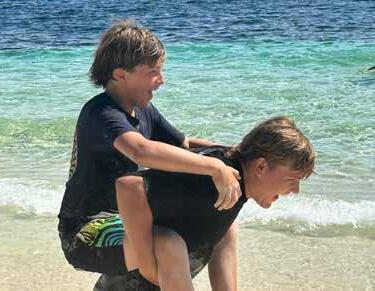
that the PFC takes time to develop (mid-20s for males) and so we need to practise using it as often as possible.
Understanding others’ emotions is the flipside of understanding our own emotions and how others affect us. As many people are trapped in an increasingly echo-chamber like existence, we must encourage young people to be empathetic. To this end, we have begun to emphasise the concept of Dignity – that all human beings have value and want to be valued. Empathy is further developed through the Aristotle EI course, but also through reading – particularly reading fiction. Putting ourselves into another person’s or character’s position is key to being able to see the world from different points of view. Ultimately, this is an experience of humility; knowing that we do not know it all and that we are likely to get things wrong.
Often, much of our learning is subconscious, but people learn about themselves and others in every interaction; this emotional learning gets added to our memory.
In terms of managing and controlling emotions, we encourage students to “get out on the balcony”, meaning that they need to find a way to break from the spiral in which they may be caught. This is a way of buying some time so that the Pre-Frontal Cortex can be re-engaged. Another key aspect of finding the space to focus is to pay attention to one’s breathing, which is an important part of Mindfulness, a critical element of Resilience. Emotional Intelligence is critical in developing attentiveness: if we cannot attend to reading the emotional states of those around us and if we cannot develop an awareness of how we ourselves are feeling, we are unlikely to get the most out of life. EI is critical in acting with humility: it is only through understanding that all of us make mistakes that we can repair damaged relationships. EI is also critical in demonstrating empathy: when we understand what drives us and others to act as we do, we can withhold or delay judgement, or we can judge more gently because we understand or have a glimpse of what others are going through. It is only by understanding ourselves and others better that we can hope to meet the challenges of the next 20 years.
Wellbeing activities at Rottnest Camp.
Pastoral Care
A time to connect and reflect on Rottnest Island
One of the most significant events for our new Year 9s is the Rottnest Camp, which took place in Week 4 of Summer Term.
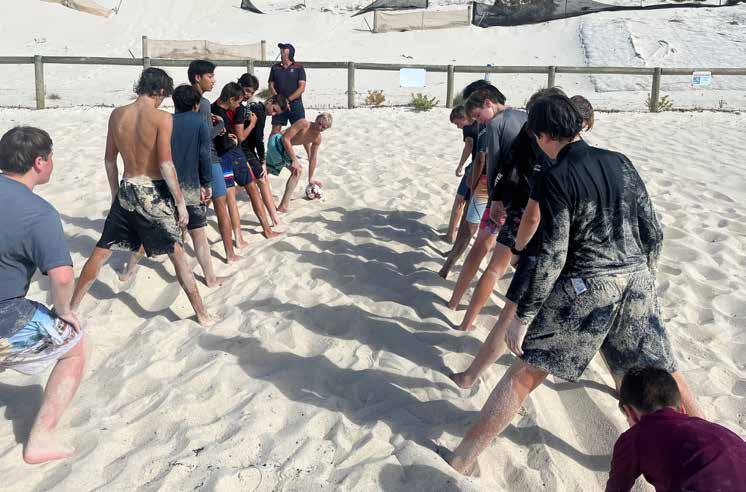
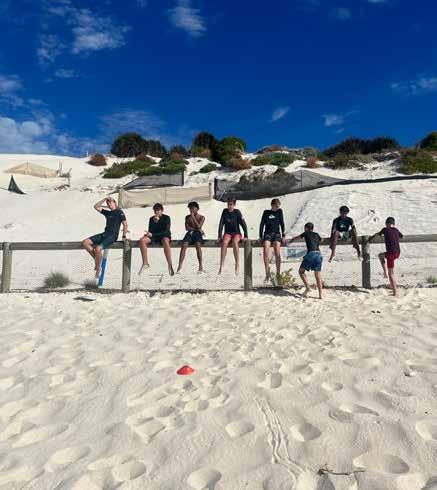
Scotch is one of the few schools to take a whole year group off-campus to one location and it plays a big role in the adjustment of Middle School boys to Senior School. The focus of the camp is on building relationships – between students and especially between the House Head and the boys in their House group. Apart from engaging in a series of outdoor activities which capitalise on us being in such a superb, pristine natural environment, it is a no-tech experience, with the bicycles being the most advanced piece of equipment with which most boys come into contact. During the Wellbeing sessions in the evening, and in many discussions with their House Head, students are given an opportunity to think about who they are and who they want to be, considering which behaviours they can leave behind and which they wish to be known for in future. Each student writes a letter to his Year 12 self, to
be opened at his final House dinner at the end of Year 12. The camp is evolving into a rite of passage, to mark the transition from one part of the school to another and, with that, to note the change in expectations from thinking like a boy to thinking of others and about the impact each can have.
James Hindle Director of Pastoral Care
The Year 9 Rottnest Camp was by far the best Scotch camp I have ever been on. We stayed at the barracks, which had a dining hall that provided lots of food and it was delicious.
The dorms at the barracks were almost big enough to fit a whole House, so we were allocated two dorms per House and split up into around nine boys per dorm. Going as a whole year group and sharing the experience was exciting. Getting to know each other and forming connections was definitely a highlight. We also spent lots of time with our House Heads and Outdoor Ed staff and we all had a great time.
The camp is evolving into a rite of passage, to mark the transition from one part of the school to another.
We competed in Beach Games and Beach Art, as well as partaking in multiple snorkelling activities where we explored the marine life around Rottnest Island. My favourite activity was Beach Art, because we had an hour in a group of six to create an original a sculpture tied into the interactive theme. My group created a quokka selfie. We also visited the general store every day, and we were allowed to buy an ice-cream or a drink. While the ice-cream was tempting, most boys settled for a drink, which was a great source of energy as we were all thirsty after a long day of riding, activities, playing backyard cricket and king of the pack at the barracks.
By Charlie Robinson Stuart House (Year 9)

 It’s all about bonding and team work for the Year 9s on Rottnest Island.
It’s all about bonding and team work for the Year 9s on Rottnest Island.
Pastoral Care 25
The importance of empowering young men to have respectful relationships
Mr Jon Marginis Lead Psychologist
Throughout all sub-schools the boys are continuously being encouraged to build upon their relationships in a respectful manner.
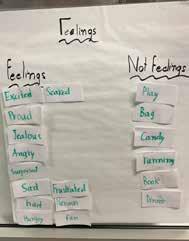
For decades, boys and men have been delivered the message that they are required to be “strong”, “thick skinned” and to have “banter”. Although it is important to have healthy level of resilience, the manner in which boys and men treat each other and others is changing for the better. Boys and young men are now becoming more equipped to call out behaviour which is toxic and harmful in nature rather than ignoring it or being a bystander to the behaviour.
In the realm of psychology, we can see that many boys and men are breaking down the stigma associated with what it means to be a man or masculine. More boys and males are accessing counselling or therapy than we have previously seen. We know that boys and men are taking ownership of their thoughts, behaviours and emotions and are wanting to continue in making positive changes in the way they behaviour and interact with others.
When reviewing why there has been a shift, a critical aspect is the role in which the school that the young man attends discusses masculinity, relationships and respect. At Scotch, the boys are engaged in a range of different programmes that assist with this positive development. When looking at the Pre-Kindergarten to Year 12 structure, it is evident that starting this young in a child’s development is critical. Within the Junior School, the boys are engaged in the Wellbeing Programme and the Keeping Safe Child Protection Curriculum.

When speaking with the boys, many are now able to identify that:
• They have the right to feel safe in all interactions with others
• The right to set boundaries with others
• Able to recognise acceptable and unacceptable behaviours and attitudes
• Create and foster respectful relationships
• Address situations or conversations if they do not feel they are appropriate.
The boys and young men of Scotch College are also equipped and encouraged to speak to a trusted network of adults should they feel unsafe or would like support on a matter. A benefit in the structure of all sub-schools, is that the boys are provided with a range of adults with whom they can develop positive relationships. This can enact their ability to speak through topics, issues or relationships, in a way that feels respectful and safe.
In the realm of psychology, we can see that many boys and men are breaking down the stigma associated with what it means to be a man or masculine.
I am positive that as the boys continue their journey into manhood, they will continue to breakdown the stigma associated with unhealthy masculinity, whilst developing and enhancing their skills around safe and respectful relationships.
Jon Marginis, Lead Psychologist, with Junior School students.
The Bib Track: Good for the soul and good for the mind
Mr Jordan Owenell Head of Boarding
Scotch College’s award winning Bibbulmun Track Programme has strengthened our boarding community for over 20 years, helping students to build resilience, self-confidence, and lifelong bonds with every step of the 1000km journey.
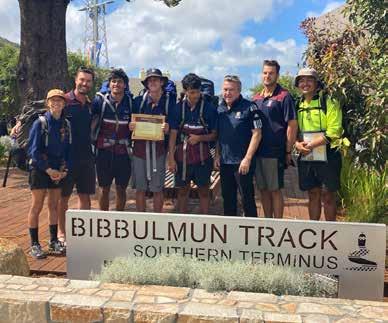
Boarders are given the opportunity to walk each section of the track, which starts in the Perth Hills and ends in Albany, throughout their six years at Scotch.
From its early days, focused on building bonds between boarders as they hike and camp throughout the Southwest, the Programme has evolved into a transformational experience that opens the doors to deeper conversations, closer connections, and ultimately healthier and happier young men.
The programme will soon incorporate the Rites of Passage framework, which aims to support young people in the transition to adulthood.
We met with Rites of Passage Institute Founder, Dr Arne Rubinstein in January to gain more insight into his Transformational
Education framework, which is built around strengthening students’ sense of self, helping them to discover their potential, building resilience and creating healthy relationships.
We are already doing a lot right with the Bibbulmun Track Programme, which has not only won awards but, most importantly, has an overwhelmingly positive impact on our boarding community. However, we do have some planned enhancements to make the boys more conscious of the reasons behind walking the track and to create further opportunities for reflection.
While in many ways going to boarding school is a Rite of Passage in itself, the Bibbulmun Track Programme provides an authentic experience for achieving key wellness outcomes.
There are no lightning strike moments where the boys suddenly become men. This is something that happens slowly each day, but the programme does provide opportunities for the boys to build closer friendships and resilience and gives them the confidence to reveal their true characters.
Without technology or other distractions, casual chats on the track naturally give way to more meaningful conversations, which is one of the secrets to the programme’s success.
The stereotype is that men don’t talk openly, and this becomes even more challenging for those living in isolated areas, particularly during busy farming seasons.
Getting boarders out on the track helps them to build closer friendships where they are not afraid to talk.
Naturally this is a good thing, regardless of whether they decide to return to their farms or home communities, or whether they do
something else entirely. And there’s no doubt – the track is good for your soul.

Captain of Boarding, Lochie Elliot will tell you that the Bib Track always leaves boarders feeling more connected to themselves and each other.
“It is a bit of a mental health session that gives boarders a chance to think about things more deeply. We talk more and really get to know each other and the staff on a different level. We always feel closer when we get back from the track, which makes Scotch feel less like a boarding school and more like a home.”
Even though Scotch boarders are generally fit, strong, and healthy walking the track is exceptionally challenging, which is one of the main reasons it builds resilience and ultimately confidence in the students.
Walking 80-100kms over the course of 5 or 6 days with a heavy backpack is a huge challenge, even for the Year 11s and 12s. The Years 7s do shorter sections for a night or two at a time, but the seniors are walking for 6-7 days at 6kms an hour and covering over 80-100kms.
I can say from experience that by the time you get to the end of the day… you’re exhausted!
Year 12 student Harrison Hammond, who is the only student to complete the entire track this year, said getting up after the first day to do it all again was the hardest part.
“It isn’t easy, and I think that’s probably one of the reasons some Year 11s and 12s choose not to finish, but others just don’t want to miss school and sport.”
In Years 11 and 12 the boys often hit state sporting teams and become very dedicated to their studies, so we understand why they don’t want to miss school and training. Completing the track and being recognised as an end-to-ender by the Bibbulmun Track Foundation is a huge accomplishment and we don’t want to dull that experience for those who achieve it, but we must also celebrate every student’s growth and persistence along the way.
A word of advice from Year 11 Rory Purser: “The boarders should focus on what they gain throughout the programme rather than on completing the entire track. It isn’t about the destination … it’s the journey. It isn’t just the stories or the memories… it is knowing that you’ve overcome something challenging. I think about the track any time life gets hard and tell myself… if you can push through that … you can push through this too.”
Scotch boarders celebrating Year 12 Harrison Hammond for completing the Bib Track.
Pastoral Care 27
Leadership through service
Callum Mitchell Vice-Captain of School (Operations)
As a College, we are always very proud of our service initiatives, how the boys rally behind causes and get involved.
Leadership through service; this is central to our culture and an integral part of our College’s identity. Every boy throughout the Senior, Middle and Junior School has the opportunity to serve through activities and service clubs. This semester we have already run a variety of successful service events which the boys can be proud of.
In Spring Term, we celebrated Boardies Day in support of Surf Life-Saving WA by dressing in our most colourful pair of boardies and we showed our appreciation and respect for the ANZACs by wearing poppies while marching on Remembrance Day. In Spring and Summer Term, All Abilities Cricket took place on Friday afternoons at Cresswell Park with an awesome group of Scotch boys there to support the cricketers and have fun. We have also reinstated the Containers for Change initiative and have set up bins for 10¢ containers around all the sub-schools. Also, Tim’s Ride ran on 26 March. This event is in memory of an old Scotch boy, Tim Anderson, with participants riding from Scotch to Tim’s memorial and back. Soup Kitchen has also continued to take place on Thursday afternoons and is an awesome initiative that takes place in the school kitchen.
We also ran one of our major service events for the year, the World’s Greatest Shave.
We had a phenomenal turnout in support for the cause with masses of Middle and Senior School students signing up to shave their heads and Junior School students opting
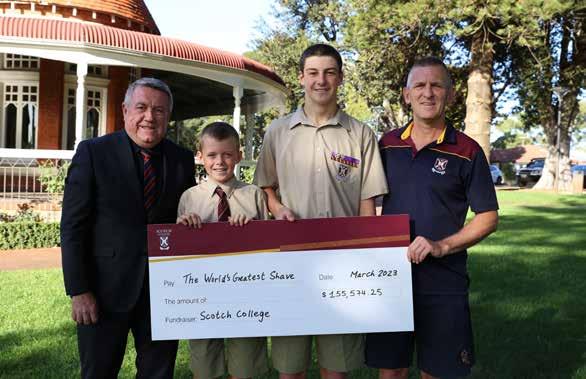
to colour their hair. Scotch College raised over $155,000 this year between the 166 students who participated, making Scotch College the top fund-raising team in Australia. This is by far the most the school has ever raised, and it is an amazing effort by all the students who put their hands up to shave their heads and by the Scotch community for supporting this fantastic cause.
It is truly amazing to see the impact our school community can have on the world. With every dollar raised, we are making a real difference in the lives of others and helping to create a better future for everyone. The funds raised through the World’s Greatest Shave will go towards supporting the Leukaemia Foundation’s efforts to find a cure and treatment for blood cancer. Funds will also help to provide vital support for regional families, such as accommodation near the hospital, emotional support and more.
Every donation counts, no matter how big or small. We encourage everyone to contribute to support these initiatives and we look forward to seeing the impact that our school community can have on the world.
Service
Dr Alec O’Connell, Headmaster, James Walawski (Year 7), Callum Mitchell (Year 12) and Richard Foster, Director of Co-Curricular with the cheque for The World’s Greatest Shave.
Building the foundations of social responsibility and community engagement
Sarah Blunt Service Leader
Middle School
Scotch College places a strong emphasis on service as a core pillar of its foundation. In Middle School, we are particularly proud of our initiatives and student engagement.
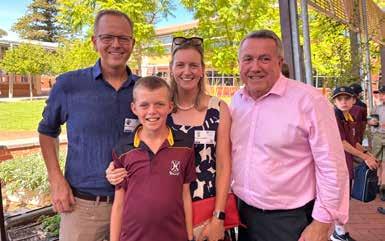
Year 8 students were recently involved in a Community Project (CP) Launch where past Year 8 Community Project students presented their stories. Students learnt about projects involving Blue Tree initiative (prevention of youth suicide), Containers for Making Change (purchasing sporting equipment for Jigalong Remote Community School), All Abilities Football (assisting with sporting achievements), and Making Memory books for aged care residence.
They participated in a round table speed dating exercise with 15 different service organisations. The immersion morning gave students the opportunity to hear from a variety of organisations that are doing important work in areas such as homelessness, elderly care, environmental conservation, all abilities sports, children’s health, podcasting, and music.
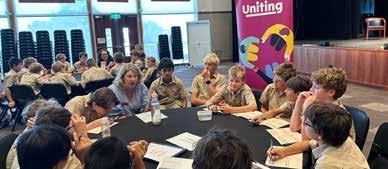
Students are now set on the pathway of discovering their service journey and learning that these experiences can have a lasting impact on their life learning and help them to become compassionate, responsible, and engaged citizens who are committed to making a positive difference to the world around them.
This term, students across the College participated in The World’s Greatest Shave and helped to raise a staggering $155,000 for the Leukaemia Foundation. The boys benefitted from hearing Dr Fiona Langdon speak about her family’s journey and how the Leukaemia Foundation has assisted her husband Ben with his treatment. Ben and Fiona’s son, James Walaski (Year 7), raised an impressive $40,000 to help support this important cause. Hearing a personal story helped the boys understand the importance and impact of their fundraising efforts. We thank Fiona, Ben, and James for generously sharing their story.
With the help of the ever-helpful Community Service Club, we wrapped up the Summer Term with an Easter Raffle. Students brought in Easter Eggs, made hampers, and organised a free dress day. Students bought raffle tickets and then waited patiently to see if they were one of the lucky 16 winners. All funds raised will be donated to East Kalgoorlie Primary School to purchase Learn to Read books. Students have learnt through this fundraising initiative that reading is a gift of life.
Hearing a personal story helped the boys understand the importance and impact of their fundraising efforts.
All the activities throughout the term have provided students with valuable opportunities to learn about and engage with a range of community organisations, fostering their sense of social responsibility and community engagement.
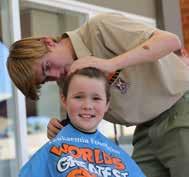 Clockwise: Year 8s at the Community Project Launch; Harry Jones shaves his head for a good cause; James Walaski (Year 7) with parents Ben and Fiona and Dr Alec O’Connell, Headmaster.
Clockwise: Year 8s at the Community Project Launch; Harry Jones shaves his head for a good cause; James Walaski (Year 7) with parents Ben and Fiona and Dr Alec O’Connell, Headmaster.
Service 29
Valuing the creative process
Sarah Combes Curriculum Leader The Arts
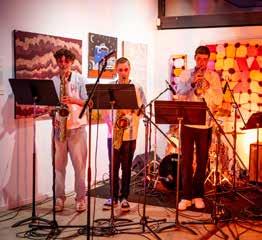
While creativity can be viewed subjectively, it is a teachable skill which is most effectively harnessed and developed through the Arts. The cognitive and physical actions articulated through the creative process allow students to imagine, innovate and experiment, essential skills needed to thrive in the 21st Century. However, in a world which continues to measure success based on the end result or product, the process undertaken to realise this achievement is often overlooked.
For many, to regularly engage in the creative process can become a source of life-long satisfaction.
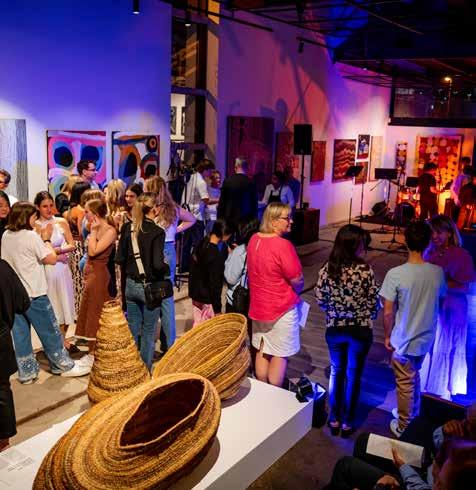
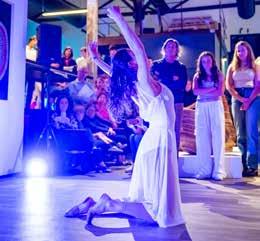
The first half of the academic year sees our students begin their artistic journey and undertake the creative process, where they will practise the highest order thinking skills, learn what it takes to encounter the unknown, persevere through challenges and continually reflect and apply feedback in a dynamic ongoing process. For many, to regularly engage in the creative process can become a source of life-long satisfaction.
In Middle School, students are explicitly taught the stages of the creative process and how to document these in their Process Journal, an essential tool for the development of creative thinking behaviours. MYP Arts places an emphasis on all phases of the creative process, enabling students to acquire a range of skills shown through the development of their artworks. The creative process can manifest in different ways between disciplines, from providing a record of rehearsals and experiments to investigations into genre and exploration of technique. This journal of creativity provides students with a personal record of their process and materializes the strategies employed to produce their final performance or artwork.
At this point in the year, our Senior School students are at the most exciting stage of their creative process, known as the illumination phase, where spontaneous new connections are formed. This will now mean moving onto the next phase of testing and evaluating their concept by putting in the hard work to bring the idea, whether that be a design, character, screenplay, or composition, to life and share it with the Scotch Community at exhibitions, recitals, and productions. While the benefits of the creative process have been championed in this article, nothing will diminish the significance of the end point of the journey for our students, for it is here where all their time and effort, blood, sweat (and the occasional tear!) are recognised and rewarded by an audience. However, this is far from being the only outcome. Sharing more insight into what goes on behind-the-scenes in the Arts highlights the importance of regarding education as a journey not a destination.
The famous quote from Ralph Waldo Emerson “It’s the not the destination, it’s the journey” or T.S Eliot “The journey, not the destination matters…” can be applied to multiple contexts, including the journey of the artist.
The Arts
Perfomers at the Intersection inaugural showcase.
WHAT’S NEW IN THE WORLD OF CREATIVE AND PERFORMING ARTS?

Pulse Exhibition at AGWA
A sneak peek at Year 12 Visual Art ATAR students Luca Datodi and Thomas Macknay’s artwork which was exhibited at The West Australian Pulse Perspectives Exhibition opening at the Art Gallery of WA at the end of April 2023. Luca Datodi’s etching titled ‘Uniformity’ is made up of 6 photographically etched plates based on photographs Luca took of his sculpture Ghillie. Thomas Macknay’s digital print titled ‘Riding Around in HeadSmashed-in Buffalo Jump’ (left) explores childhood memories and nostalgia during a time of transition into adulthood.
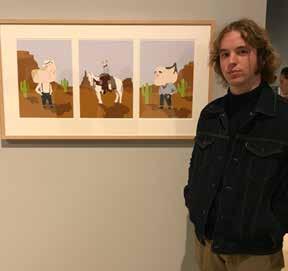


Year 12 ATAR Design Photoshoot Day
Our Year 12 ATAR Design Photography and Graphics students have been busy developing their body of work in response to their individual design briefs. The projects cover a diverse field base, from promotional graphics for a golf tournament, designs for a new mountain bike track, a relaunch of a retro Pontiac car but as an electric model and designs for an original novel cover. Here you can see a photoshoot day where they gathered raw material for their graphics from several venues including the Wembley Golf Course, Cottesloe beach and the city. We look forward to seeing the portfolios develop further into the year.

The Arts 31
Intersection


Intersection is the inaugural showcase of musical works devised and realised by students, staged at FORM Gallery in Claremont. This event showcased the collaborations undertaken by Scotch College and Presbyterian Ladies’ College students with non-music students. It featured the world premieres of contemporary films, dance performances and musical works from students in Years 10, 11 and 12. “It’s been challenging but also rewarding to design my own real-life project with another area of the Arts (Film). I’ve had to be involved in all the moving parts, from creating the music, recording 8 musicians, and working with the director of the film”. Caelan Browne (Year 12)
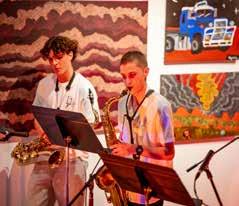
Media Perspectives Award
Each year the Australian Teachers of Media (ATOM) host an annual showcase of the top graduating student work. In WA this event was held on March 8th, at the Burswood Community Cinemas. It was a wonderful evening under the stars that inspired our current Media and Film students as they head into their own film productions. It was made particularly special as our very own OSC Oli Brown’s film “Evanesce” was one of the 17 films screened. His film is a beautifully crafted study of how our elderly cope with being alone. It was wonderful to see Oli’s work on the big screen, and we all are very proud of his achievement. Oli says, “I wanted to make an impactful film that represents the problem of loneliness in elderly people, as they are often forgotten about and underrepresented in society for being, ‘out-of-date’”.
Film Production –Behind the scenes
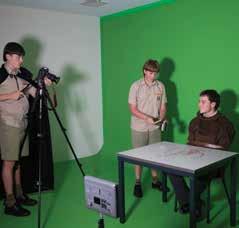
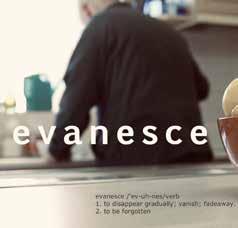
Our Year 11 ATAR Media, General Media and IB Film students are engaged in various film production tasks. These include Teen Genre Films, German Expressionism sequences and ‘Day in 60’ edits. Students are working through the Production Stage of the creative process where their narrative ideas are coming to life. The focus in Year 11 is to hone practical skills and build expertise in a variety of production roles; cinematographer, editor, art director and sound designer. Students are learning how to effectively light a film set, use camera rigs, and apply camera movement with purpose. The ATAR students are currently working towards participating in a Critique Day where the ‘rough cut’ will be viewed by peers who will offer constructive criticism prior to the fine cut submission.
Treasure Island rehearsals
Treasure Island rehearsals are well underway with Year 11 and 12 students from Scotch and PLC developing a wide range of skills in the process. Preparations began with an accent workshop with Voice and Performance Trainer, Julia Moody whose extensive experience as previous Head of Voice in the Acting Department at the West Australian Academy of Performing Arts for 21 years proved extremely valuable when teaching the cast how to produce authentic sounding Cornish and Cockney accents. Another important skill cast members must learn is stage combat, for it would not be swashbuckling adventure without some exciting sword fights choreographed by Nastassja Norwood from Stage Combat Perth.
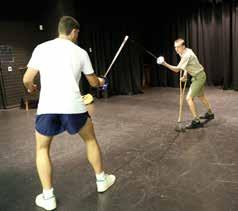
Developing confident and empathetic individuals through Performing Arts
We are so incredibly fortunate to be able to offer our boys a dynamic Performing Arts Programme, complete with a new Junior School Performing Arts dedicated classroom.
Music and Drama lessons provide a unique opportunity for boys to develop social and emotional skills in a safe and supportive environment. It allows boys to express themselves creatively, explore their emotions, and learn how to empathise with others. These skills are essential for building positive relationships, both in school and in their personal lives. Performing Arts also provides a platform for boys to practise public speaking, teamwork, and leadership skills – which are crucial for success in all areas of life. Additionally, they can help boys develop confidence and self-esteem, which can benefit them both academically and personally. All our boys in the Junior School Primary Years (3-5) are involved in lessons, activities, and performances to introduce them to the opportunities, fun and excitement which the Performing Arts can offer.
In Drama lessons, the boys use the exploration of different characters and situations, learn to think critically, problem solve and develop their own unique perspectives.
In Music, the boys in Year 3 transition into the Primary Years Music Programme having already experienced our Early Years Music Everyday Programme. They continue their musical learning by building on their existing musical knowledge and continue to develop aural skills, improvising, singing and playing pitch patterns. They work and use the elements of music to create music ideas incorporating tempo and dynamics, and record and communicate their music ideas using graphic and/or standard notation and terminology. Students experience music as performers and audience members, singing and playing instruments, and experimenting with dynamics to improve their performance. By now, many of the students are learning an instrument and are encouraged to participate in mini performances showcasing their instrumental prowess, with a focus on building confidence and having fun.
The Scotch Junior Boys Choir programme has been busy with performing for Grandparents Day, and the Junior School Soirée. There is nothing more angelic than the sound of the voices of young boys!
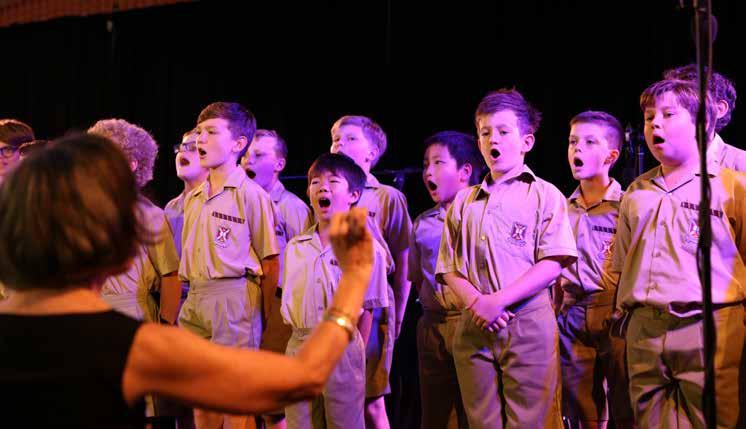
In Drama lessons, the boys use the exploration of different characters and situations, learn to think critically, problem solve and develop their own unique perspectives.
There is so much joy and enthusiasm about the up-and-coming activities, events, and new learning within The Junior School Performing Arts Programme, as the boys are highly engaged, and eager to learn! This term we are busily preparing the boys for the Independent Primary School Heads of Australia (IPSHA) Performing Arts Festival, hosted by Penrhos College during Term Two. The rehearsals are proving to be fun-filled, with lots of laughter and genuine support for one another, as the boys learn new concepts, and challenge themselves far beyond their expectations! So watch this space, there is plenty more to come!
Anne Champion Junior Music Teacher
Paula McBain Drama Teacher
The Arts 33
The Junior School choir performing at the Junior and Middle School Soirée.
It’s a wrap! Scotch delivers a sport season to remember
The Summer sport season, the last for the Year 12s, has come to a fantastic end. All boys have played with the passion, spirit, and sportsmanship expected from a Scotch boy. While not everyone has seen success and not every team has won the league, everyone tried their hardest and played in the right spirit, no matter the sport or the division.
This season has seen some brilliant individual and team highlights. A special mention to the swimmers who won the PSA Swimming Carnival taking home the Tregonning Cup for the first time in 38 years. To put that into perspective, Scotch teacher Mr Hindle was in Year 12 as Head Boy when this feat was last achieved. While the carnival was at HBF stadium this year, it was held at Beatty Park back when Scotch last achieved swimming glory! Now it is onto the Athletics Team in Term 3 to try and mirror the swimmers’ success.
Across the rest of the PSA sports, Scotch had another terrific season:
• The Firsts Basketball finished fifth.
• The Firsts Cricket finished fourth.
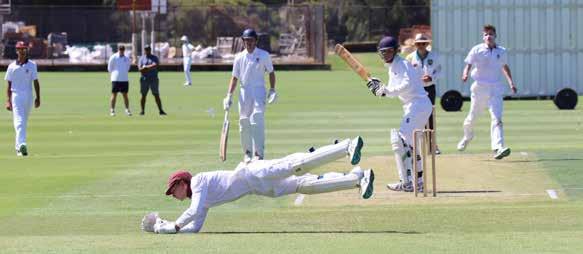
• The Firsts Tennis Finished fifth.
• The Firsts Volleyball finished sixth.
• The Firsts Water Polo finished third.
Overall, there were some marvellous achievements by all Scotch teams.
The Basketball teams produced some memorable performances with all boys trying their hearts out. The Firsts were looking to
the future finishing fifth with some promising signs ahead. There was even a Year 9 student who managed to debut in the Firsts which, of course, is an incredible achievement. Whether it was the 9C or Firsts Basketball Teams, all boys played in the right Scotch spirit no matter the result.
In Cricket, all the years had a season with highlights a plenty. The Firsts’ season started remarkably with a win and a fantastic century from Captain Hayden Henschel. Overall, they finished fourth in a very tight Darlot Cup cricket competition won by Christ Church. Josh Griffin and Hayden Henschel managed the fairytale finish for their Darlot cricket careers both ending with 127 runs with a win against Trinity. It wasn’t just the Firsts who performed successfully, however, with all teams performing well. The Fourths Cricket Team topped their division losing just one game. The season was topped off with an exhilarating win against Hale and then a win over Trinity to round out the season. The Thirds Cricket and Seconds Cricket teams, whose seasons were not quite as successful, saw some great development of the players with mass improvement.
Water Polo also had an incredibly strong season, finishing third overall with an incredible one goal win over Trinity. Out of the summer PSA sports, Water Polo was the best performing team. What makes their achievement even more outstanding is the large number of Year 10s in the team, making them one to watch for this year’s Dickinson Shield.
While Volleyball had a tough season with teams filled with boys playing for the first time, they did an amazing job of improving, finally winning a game against Guildford later in the season. It was great to have some Year 12s transfer from their respective sports to head Volleyball in the right direction with the Year 12s in Firsts doing an incredible job of mentoring the younger boys in the team. The fact there were two Year 9s and a Year 10 in the Firsts Volleyball Team is a very exciting prospect for the future. The Seconds Volleyball Team topped their division with many of the boys in Years 10 and 11 proving their case to be up for selection for Firsts next year.
The rowers also had a good season, training hard for six months with the Firsts finishing fourth in Head of the River and overall coming fifth in the Hamer Cup. Rowing is arguably the toughest of the summer sports, so it is amazing what the boys have accomplished and endured with their many 4am starts. As Captain of Boats quoted in his address to the school “you don’t have to be crazy to do rowing, but it does help”.
Finally, the Tennis boys also fought hard, finishing with five wins and seven losses in the Firsts. After two years winning the Corr Cup, unfortunately the boys couldn’t repeat it for a third year. Led by Captain Rob Eastman, however, the teams focused on growth and development for upcoming seasons, and it was still an incredible effort to win nearly half of their fixtures for the year.
Henry Feutrill Vice-Captain of School (Operations)

Sport

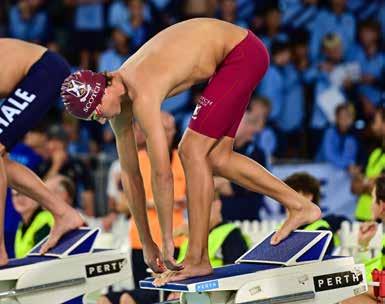
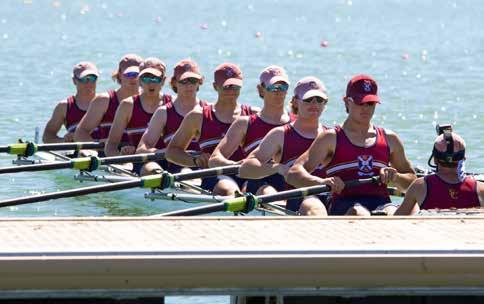
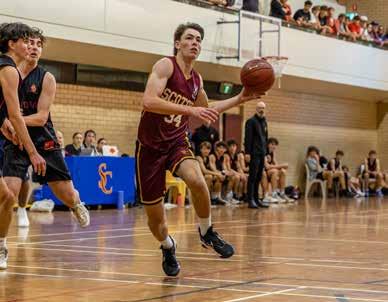
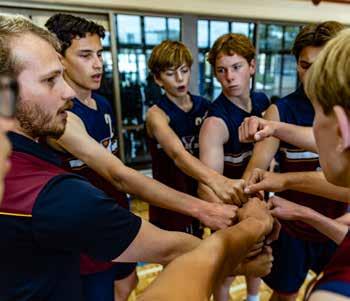
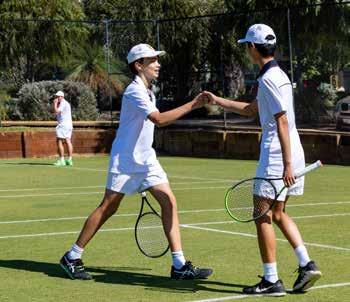
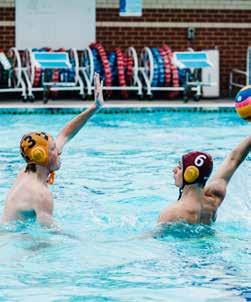
Sport 35
A 38 year victory for the Scotch Swim Team
On Thursday, 9th of March, Scotch College achieved something that hadn’t been done for 38 years.


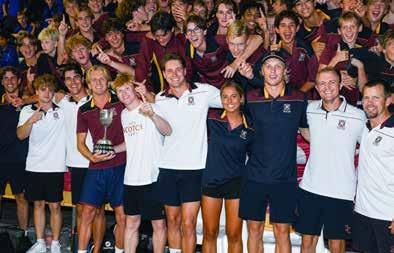
With a nail-biting battle against Christ Church the whole night, Scotch College won the 2023 PSA Swimming Carnival by 15.5 points, with Hale taking out third place. Over the last four years, Scotch has continued to establish itself as a school to watch at PSA Swimming Carnival. By consistently placing in the top three, the boys have seen a fundamental shift in culture, attitude, and belief in what the school can achieve. This belief was more evident than ever, led by Daniel Boshart and Mack Williams, and the swimming season started well with consistent numbers at training and a desire to improve. This was followed by solid performances at our first few meets, seeing the boys swim their best times. This momentum carried through the summer holidays and swim camp, with the boys working harder than ever. The team knew this might be our year from the start of the season. The school has never looked stronger from Years 7 to 12. However, following Scotch’s best performance at Quads, winning Division One and narrowly coming second overall to Christ Church, the attitude changed from this might be to this will be our year.
Going into the PSA Swimming Carnival, we knew we had to be perfect to win. Scotch couldn’t afford to be disqualified in any race, and we needed to bring the right intensity, purpose, and belief to the competition. At training, we established a zero-disqualification rule, and I am proud that Scotch achieved that on the night, which was an integral part of our success. Not only did the boys swim unbelievably well on the night with close to a 100% PB rate, but they also supported each other in every race. It was great to see the Year 12 boys chanting the names of every swimmer as they got on the blocks. It was indeed a culture and team spirit to be proud of.
Throughout the night, it was a close battle with Christ Church. Scotch got an early lead after the Freestyle and Breaststroke events only for Christ Church to regain ground in the Division Two relays. At the start of the Division One Medley Relays, Christ Church had a one point lead for the first time in the meet. This meant that over the final races, we had to see a strong performance by the Scotch relay team. Scotch won three out of the last six relays and placed in the top for the other three. It was an incredible achievement for the boys and one I know they will keep with them for life.
A fantastic effort on the part of all the swimmers and a particularly emotional victory for those fathers who were also part of the Scotch PSA Swim Team that won back in 1985. Multi-generational Scotch champions –what an extraordinary feat indeed!
Ryan Steenkamp Head of Swimming
Daniel Boshart celebrates the 38 year victory with the team.
Passion and determination in Middle School sports
Meanwhile, in Middle School, the Year 7, 8 and 9 Summer Sports season was also filled with passion, hard work, and determination.
One of the most notable events of the season was the exceptional performance of the Scotch College Swimming team, as they clinched the coveted Dr K.G. Tregonning Cup, ending a drought of 38 years. Notably, the Middle School students played a vital role in the team’s triumph, with the U13 and U14 squads finishing second and first, respectively. The team's success was the result of months of dedicated training and teamwork, and we are incredibly proud of their accomplishment.
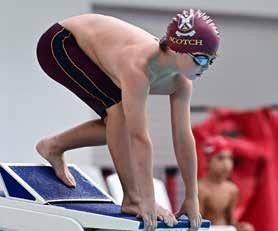
Our Year 7 students were also involved in the PSA Sports programme for the first time this season, with weekly fixtures against other schools. Seeing our young athletes showcase their talent and passion for sports was exciting, and we are thrilled to have them join the PSA community. Congratulations to the Year 7A Tennis team, who were undefeated this season. The future looks bright for Scotch Tennis.
Our students demonstrated sportsmanship, respect for their opponents and coaches, and a willingness to learn and improve throughout the season. Their dedication and commitment to their respective sports were evident in their performances and progress throughout the season.
Beyond the successes on the field, court, and pool, the Summer Sports season provided an opportunity for our students to develop essential life skills, such as teamwork, communication, leadership, and resilience. These skills will undoubtedly serve them well in all aspects of their lives, now and in the future.
Thank you to our coaches, teachers, and parents for their support throughout the season. Their commitment and encouragement were essential to the success of our teams.
We look forward to continuing this momentum into the Winter and Athletics seasons and cannot wait to see what our students accomplish next.
Kristian Leeson Assistant Head of Sport
Year 3 commence their JPSSA Journey
It is a well-recognised fact that regular sport lessons have many benefits for students of all ages.
In Junior School, it encourages positive social and emotional interactions across the year group, allowing students from different classes to mix and play together.
School sport is an important part of life at Scotch and this year, our Year 3 students are excited to begin their journey in JPSSA sport. They will be engaging in regular JPSSA carnivals against Christ Church, Hale, and Aquinas. There will be one carnival a term to allow the students to focus on a particular sport. In Term 1 our students are working on their cricketing skills in PE and on a designated sport period which sees all the boys come together to practise for these carnivals.
The carnivals help teach our students important values about respect for all, disciplines, and patience. They prepare the boys for what lies ahead in the sporting field as they learn to work with others to achieve a common goal.
Team sports build self-confidence as the students play and learn games which may be new to them. They encourage and develop communication skills as our Year 3s actively share their ideas and communicate their needs to their teammates.
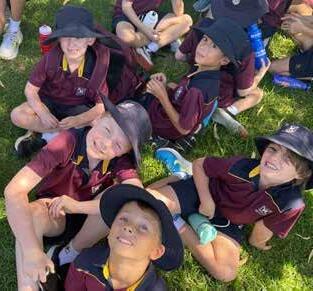
We are excited about showcasing the abilities of the students whilst watching them to develop the important life skills that team sports offer our Scotch students.
Scott Whiston Head of Junior School Sport
Sport 37
Year 3s Gus Meredith Humphries, Theo Black, Charlie Baldacchino, Liam Reid, Banjo Jones enjoying JPSSA.
Recent achievements by the OSC
• The OSC is hosting a strategy day with heaps of proposed initiatives for it to tackle in the short to medium term including the improvement of its database and enhancing opportunities for interaction through mentoring. The OSC Committee has much work to do.

• Our gala event, the Founders’ Day Dinner was top shelf with the Story of the move to Optus Stadium which included Ian Olson of Gage Roads Brewing Co (OSC 1985), John Flecker of Multiplex (OSC 1984), former Scotch Parent and Premier of Western Australia the Hon. Colin Barnett and current parent Oliver Peterson. The panel discussion was engaging and invoked lots of interest from those who attended about the move away from Subiaco. The OSC Committee is committed to providing thought provoking and engaging speakers for its events including Founders’ Day.
I wish to pass on my thanks to outgoing members of the OSC Committee: Denver Quantrill, Greg Ledger and Harry Gilchrist. I also wish to provide a warm welcome to Ben Bartholomaeus and Banjo Harold to the Committee.
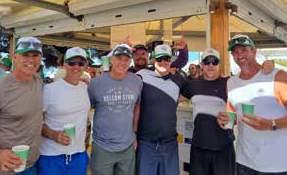

Avid readers of the Clan will also be used to reading the message from Mark Paganin, Chair of Council. Mark retired from the Council at the end of last year and I wish to record an expression of thanks from the members of
Scotch Business Directory



the OSC for his commitment to the College over a considerable period (despite being an Aquinian).
Lastly and only partly related to the OSC, you may have heard that the College’s swimming team broke a 38 year drought to win the PSA Swimming recently. A week later, a group of OSC from the time that Scotch won 38 years ago jointly participated in the Port to Pub swim, winning the Legends category in a blistering time of 5 hours and 58 minutes. A photo of their feat is below and includes (from left to right), Ben Devenish (OSC 1987), Bruce McCully (OSC 1987), Anthony Hewett (OSC 1988), Jeremy Pethick (OSC 1987), Colby Leaman (OSC 1987), Stewart Rhodes (OSC 1987) and Dave Harvey (OSC 1987) at rear. The OSC wishes you every success for the year ahead.
We encourage our community to support locally owned businesses as much as possible. Check in to the directory before making your next purchase or booking a service, and you might just find some great deals too!
OSC President
by the Old Scotch Collegians, our Business Directory has proudly featured local, regional, national and global businesses founded by our alumni. We have expanded the directory to include the wider school community, and invite parents and those with significant connection to Scotch College to have their business included.
business
scotch.wa.edu.au/scotch-business-directory
Supported
Submit your
or visit the directory at
Now open to the wider school community
Australia Day honours for leading genetic pathologist Professor Edwin Kirk

screening to Australian couples who are planning a pregnancy or are early in a pregnancy. We’re all carriers for rare recessive conditions, and usually that doesn’t matter unless both parents are carriers for the same condition (X-linked conditions are different – only the female partner needs to be a carrier for those).
driven by improvements in laboratory medicine. The chance to be part of that was a strong drawcard, although I had no idea when I started in the lab just how dramatic the changes would turn out to be.

Q: What are your fondest memories of your days at school?
The Old Scotch Collegians were thrilled to hear the news that Professor Edwin Kirk (OSC 1983) was appointed as a Member of the Order of Australia in the 2023 Australia Day Honours List for his contributions to genetic pathology and clinical genetics.

Among his long list of accomplishments, Prof Kirk has authored more than 125 scientific publications and is co-leading a ground-breaking national reproductive genetic carrier screening study, Mackenzie’s Mission.
We were honoured to speak with Prof Kirk recently to find out more about his journey since graduating from Scotch in 1983.
Q: Was the award a surprise?
How did you find out about it, and what happens after you are told that you are being appointed a Member of the Order of Australia?
It was a bolt from the blue – completely unexpected. I was on holiday overseas and shouldn’t really have been looking at my work emails, but when I saw this one, I was glad I had. The initial message said I was being considered for the AM, giving me the option of accepting or declining the nomination. Then in early January there was another email saying the award was confirmed. It’s all very secret until the day on which the award is announced; I didn’t tell anyone except my wife until Australia Day, not even my parents or children. The ceremony (the investiture) is not until a few months later.
Q: Is there a particular body of work that you are most proud of?
For the past few years, my life has been dominated by Mackenzie’s Mission, a national research project of which I am co-lead (see mackenziesmission.org.au for details).




The goal of the project was to study how best to deliver reproductive genetic carrier
The project showed that a bit over 1% of couples have a 1 in 4 chance of having a child with a severe genetic condition. Most do not find out about this until they have an affected child. The purpose of carrier screening is to identify the carrier couples before they have an affected baby, so they have choices about what to do with the information.
I’m really proud of this project; it has been a wonderful opportunity to work with a large group of people who are dedicated to the same cause, from across Australia, and we hope it will make a big difference for Australian families in the future.
Q: What did you do after you left Scotch College and what drew you to a career in genetic pathology?
After school I studied medicine at UWA, and after my intern year I rattled around for several years, spending time in Townsville (where I met my wife), London and Adelaide (where we were married, in 1996) as well as returning to Perth twice, for 6-month stints at Princess Margaret Hospital, before finally settling in Sydney.
I didn’t have any burning ambitions when I left school and I pretty much drifted into paediatrics. A major factor in my career choice was that when I was working in London, I could earn a pound an hour more for working with children than I could in adult medicine! After a while I realised that I was happy working with kids and decided to stick with it. During my paediatric training, I noticed that wherever I worked, any time we saw a child with a complex, interesting medical problem, we called the geneticists in for help. It seemed like being on the other end of those phone calls might be a good thing.
After completing my paediatric exams, I was lucky enough to get into clinical genetics training, and then very fortunate to be offered a consultant job at Sydney Children’s Hospital in 1999; I work there still. After more than 10 years as a clinical geneticist, the opportunity to retrain as a pathologist came up. I trained part time over several years and have been splitting my working life between the clinic and the lab ever since. The changes in genetics in the last decade or so have been mainly
My memories of Scotch are very happy ones. I was a boarder in Brisbane House – at the time there were three boarding houses and seven houses for the day students. I started in year 9 and it took a while for my housemates to get used to me (and vice versa) but once I settled in, it was a great life – we had a lot of freedom, particularly on the weekends. I loved the school – I had excellent teachers all the way through, and I really enjoyed debating, swimming (although I never made it past reserve for the relay team), chess and drama. I usually had a part in the annual school play and was captain of a debating team that won the state competition.
Q: What advice would you give to current students looking to take a similar path in medical research?
That’s a tricky one, since my career has been characterised more by a series of lucky breaks than any kind of plan that others could consider following. Perhaps that’s a piece of advice though: if opportunities come your way (not just in research), grab onto them, and don’t let them slip past. My experience has been that it’s well worth taking a chance on something new, and that you can’t predict where things may lead when you start.
As a general piece of advice, doing research can represent a very big commitment of time and effort. You should choose an area that really interests you, and that you think is worthwhile. For those who are starting out, your choice of supervisor is as important as your subject area; speak to previous students who have worked with a prospective supervisor to find out how much support you can expect, and what the working environment will be like.

Alumni Spotlight Old Scotch Collegians 39
Obituaries
Mervyn Matthews
(OSC 1946)
Tartan ran in the veins of the late Mervyn Matthews, who passed away on 4 December 2022.


Merv was known to hundreds of Old Scotch Collegians, and made exceptional contributions to the College, to our Scotch alumni, and to our school community.
Merv attended Scotch from 1942 to 1944, leaving after his Junior year (Year 10). He was a handy hockey player, and active in Cadets. One of his favourite memories was riding to school on his pushbike, with his rifle slung casually across his back. He also had fond memories of marching and building trenches on the memo grounds, getting ready for the war.
Whilst his time at school was relatively short, his contribution thereafter was immense. After leaving school at 16, Merv started at local engineering supplies business McPherson’s and worked his way up to senior roles over a distinguished 40-year career.
Merv sat on the College Council from 1978 to 1984, and served on the OSC committee for 20 years, from 1978 to 1998. He was the OSC Administrator for 12 years (1986 to 1998), and after stepping back from that role, he remained an active volunteer with Scotch archives and alumni research until 2012.
Celebrating lives
Brenton G Field 1977
Bruce Arlow 1961
Christopher Bowman 2006
David Outhwaite 2003
Errol Tout 1976
Geordie Gray 1999
Harold Ryan 1950
Henry Seddon 1954
Hilton Bradford 1963
Ian White 1962
John Huber Garnett 1976
John Young 1963
Leo Johnson 1956
Mervyn Matthews 1946
Peter Evans 1977
Reginald James Ross Campbell 1957
Richard Rodda
Robert Gillett
Robert Doyle
William Brian Robinson
Ronald Robert
Steve Britten
Don Lamb
Peter Hardie
Don Challis 1974
George Clarn-Walker 1955
Graham Goulden 1960
Kim Paterson 1952
John Hogben 1960
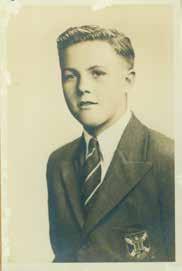
Ron Creagh 1960
Due to all these roles, Merv became the face of OSC to year after year of our graduating students, as well as a stalwart to so many alumni and College staff and families.
His memory was prodigious and his knowledge of family connections amongst OSC’s was nothing short of magical.
Merv was always supported by his marvelous wife, Margaret, and was so proud of the generations of his family who have attended Scotch, including his sons John (OSC 1981) and David (OSC 1984) and his grandsons Rhys (OSC 2011), Bryn (OSC 2013) and Aidan (OSC 2020).

In later years, Merv attended OSC events, especially Seniors lunch and Founders Day, often accompanied by longtime Scotch staffer, Kate Quinn, and accompanied by long-time OSC Committee member John McNaught (OSC 1958), who remembers that Merv was absolutely meticulous in keeping track of Old Scotch boys, never failing to recognise their names in the newspaper and proudly recite their achievements.
In 1999, OSC awarded Merv its inaugural honorary life membership for his incredible contribution. Merv left a lasting legacy at the College, and he will be missed.
Michael Silbert (OSC 1979)
OSC Committee Member OSC President (2013 – 2021)
Calendar
Fri 26 May Seniors Lunch Dining Room
Fri 23 June
Class of 1993 –30 Year Reunion Gooch Pavilion
Fri 4 Aug
Class of 2013 –10 Year Reunion Venue TBC
Thurs 31 Aug
Wine Tasting Old Bridge Cellars
Fri 8 Sep
Class of 1983 –40 Year Reunion Venue TBC
Thurs 12 Oct New Members Function Venue TBC
Fri 13 Oct
March Out Playing Fields
Fri 20 Oct Founders Day Dinner Dining Room
Fri 27 Oct
PSA Golf Day Cottesloe Golf Club
Fri 3 Nov
Class of 2003 –20 Year Reunion
Venue TBC
Fri 24 Nov
Class of 1953 –50 Year Reunion
Venue TBC
Thurs 30 Nov
St Andrews Day Vale Chapel
1956
1966
1946
1951
1960
1968
1959
1947
Merv Matthews with son John Matthews (OSC 1981) and grandson Aidan Matthews (OSC 2020); Merv Matthews at the age of 15 in the Scotch College portrait.
Wine Tasting
Our popular Annual Wine Tasting event was held on 25 August last year and hosted by Jay Beeson (OSC 2001) at his family business, Old Bridge Cellars.
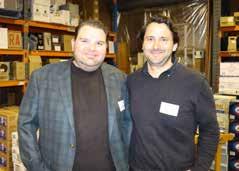
Amongst the cartons at Old Bridge Cellars warehouse, guests were treated to a beautiful range of locally produced wines from Denmark’s renowned Forest Hill Vineyard while hearing from their winemaker Guy Lyons (OSC 2001).

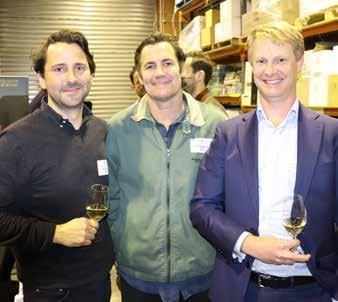
Business Directory Launch
We were delighted to officially launch the Scotch Business Directory at Euroz Hartleys in September 2022. Joined by business leaders Tim Bunney (OSC 2005), Richard Young (OSC 1982), Aaron McDonald (OSC 2001) and Garrett Prendiville (OSC 2003), we met diverse companies and explored what the future of business looks like.
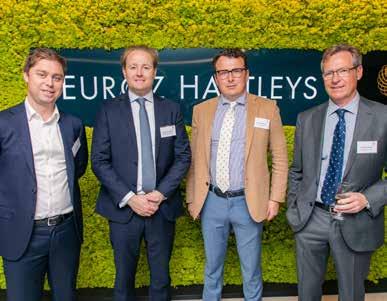
Thank you to Euroz Hartleys, Domaine Naturaliste Wines and Gage Roads for generously sponsoring our event.
Our Business Directory is now open to alumni, parents and past parents within the Scotch community. Find it at scotch.wa.edu. au/scotch-business-directory


 Clockwise: Guests networking at the Business Directory Launch; Tim Bunney (OSC 2005), Garrett Prendiville (OSC 2003), Aaron McDonald (OSC 1981) and Richard Young (OSC 1982)
Clockwise: Guests networking at the Business Directory Launch; Tim Bunney (OSC 2005), Garrett Prendiville (OSC 2003), Aaron McDonald (OSC 1981) and Richard Young (OSC 1982)
OSC Events Old Scotch Collegians 41
Clockwise: Guy Lyons (OSC 2001), Chris MacKinnon (OSC 2000) and Steven Hendry (OSC 1999); Jay Beeson (OSC 2001), Guy Lyons (OSC 2001); A selection of Forest Hill wines.
Founders Day Dinner
At last year’s Founders’ Day Dinner guests were treated to intimate details of the stories and deals that were behind the making of Australia’s most awarded stadium, Perth’s Optus Stadium.
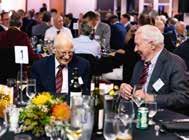
PSA Golf Day
The annual PSA Old Boys Golf Day was held at the Cottesloe Golf Club last October.
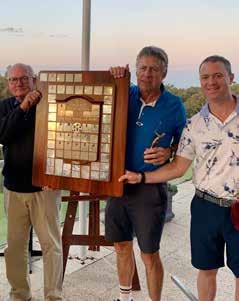
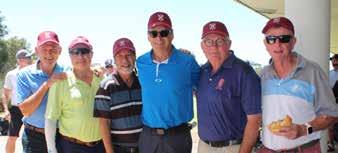

Competing against a field of 128 golfers, the Scotch team narrowly claimed the Shield with solid points from our top players, Tony Bovell (OSC 1970), Rod Sedgwick (OSC 1970), Richard Young (OSC 1970) & Alex Gordon (OSC 1997).
It was a fantastically fun day of camaraderie with a healthy dose of competition.
A brilliant panel of guest speakers included The Hon Colin Barnett MLA (past Scotch parent), John Flecker (OSC 1984 – CEO Multiplex) and Ian Olson (OSC 1985 – Chair Good Drinks Australia), facilitated by current parent and 6PR radio host, Oliver Peterson.
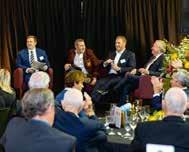
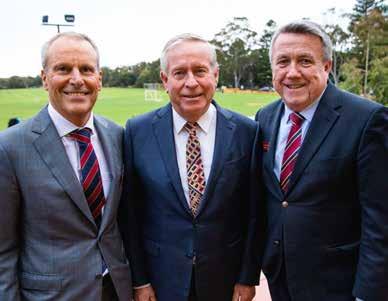
An interesting fact – Scotch College won the first event in 1956 and has won 23 times since! There’s only been one draw, which was between Old Aquinians’ Association and Christ Church Grammar School – Old Boys’ Association in 1983. Old Haleians Association has won 15 times, Aquinas 10 times, Old Wesley Collegians’ Association 7 times, Guildford Grammar School 6 times, Christ Church 3 times and Trinity College once.

 Right: PSA Golf Day winning team.
Clockwise: Don Bantock (OSC 1950) and Bruce Barblett (OSC 1950); Mark Paganin, The Hon Colin Barnett MLA and Dr Alec O’Connell, Headmaster; Founders Day Dinner panelists.
Right: PSA Golf Day winning team.
Clockwise: Don Bantock (OSC 1950) and Bruce Barblett (OSC 1950); Mark Paganin, The Hon Colin Barnett MLA and Dr Alec O’Connell, Headmaster; Founders Day Dinner panelists.
Class of 2012 Ten Year Reunion

Around 70 members of the Class of 2012 enjoyed their Ten-Year Reunion at The Sandbar in Scarborough in November. Matt Kelly, 2012 School Captain, made it back from an interstate match with the West Australian Sheffield Shield cricket team


just in time for the event, and the parents of Matthew Jonklaas, Pat and Sue, who very sadly passed away in 2018, joined the group briefly at the beginning of the night in remembrance of Matt who will always remain a beloved member of the Class of 2012.
St Andrews Day Vale


The memorial service is an annual occasion for the friends and families of Old Scotch Collegians who have passed away in the preceding year, to come together in remembrance and celebration of their lives.
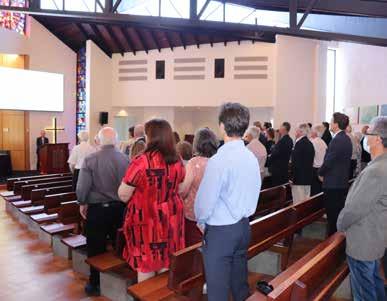

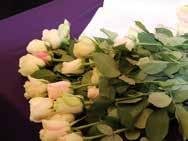 The Old Scotch Collegians held the St Andrew’s Day Vale Service in the Scotch College Chapel on 30 November, followed by morning tea in the Memo Hall Foyer.
Attendees at the service in The Chapel.
The Old Scotch Collegians held the St Andrew’s Day Vale Service in the Scotch College Chapel on 30 November, followed by morning tea in the Memo Hall Foyer.
Attendees at the service in The Chapel.
Old Scotch Collegians 43
Clockwise: Group photo for the 2012 Ten Year Reunion attendees; Lewis Pickering, Jordan Craddock and Matt Kelly; Mitchell Steinberg Piper, Ryan Shrine, Matt Kelly and Karl Sarich.
Tartan Lawyers Breakfast

PLC and Scotch Old Collegians, with students from both schools, joined us for the Tartan Lawyers Networking Breakfast at Perth’s Clayton Utz office.

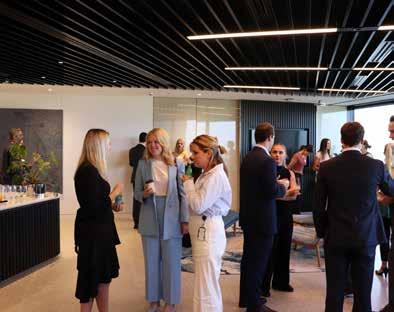

A ‘NextGen Law’ presentation was moderated by Partner at Clayton Utz, and PLC Old

Collegian, Liz Humphry, alongside an insightful panel of Senior Associate at MinterEllison, Ed Fearis (OSC 2004), Senior Associate at King & Wood Mallesons, James Nagle (OSC 2006) and Senior Associate at Allens, Mathea McCubbing.
Class of 1963 Sixty Year Reunion
In March, the Class of 1963 celebrated their Sixty Year Reunion! The cohort enjoyed pre-drinks overlooking the playing fields, and a buffet luncheon in the newly re-developed Gooch Pavilion. It was lovely to see a large group of old friends laughing and sharing memories from school and beyond.
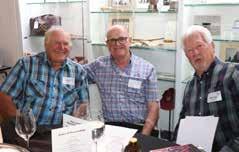


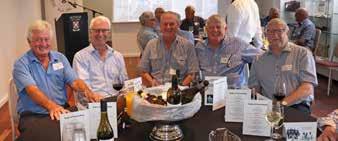 Top right: Ian Urquhart, Ross Campbell, Clive Tonkin, Peter Edwards and Bob Grieve.
Above: Geoff Morgan, John Foster, Michael Branson.
Right: Geoff Morgan (Seated) and Peter Silinger.
Top left: Alex Gordon (OSC 2008), Tom Ledger (OSC 2009), Michael Denny (OSC 2008), Andrew Bartlett (OSC 2010), Andrew Moullin (OSC 1997).
Above: David Kyle and Mark Paganin with students.
Top right: Ian Urquhart, Ross Campbell, Clive Tonkin, Peter Edwards and Bob Grieve.
Above: Geoff Morgan, John Foster, Michael Branson.
Right: Geoff Morgan (Seated) and Peter Silinger.
Top left: Alex Gordon (OSC 2008), Tom Ledger (OSC 2009), Michael Denny (OSC 2008), Andrew Bartlett (OSC 2010), Andrew Moullin (OSC 1997).
Above: David Kyle and Mark Paganin with students.
Peter Plaisted | 1963
I am now happily retired after a long and varied career as a small business owner.
After leaving school in 1963, I opened SportSpot in Cottesloe in 1973. After operating successfully for 16 years I needed a change and transitioned into real estate, before deciding to go into business on my own again. I owned and operated Pete’s Gold Bins for 26 years, a time in which I made lots of friends and caught up with many Old Scotch Collegians who became very loyal customers.
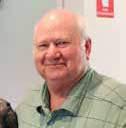
Mark Brayshaw | 1983
I left Scotch forty years ago after five terrific years. Much of my career involved sport, following a modest AFL playing career which included a brief time at Claremont and North Melbourne. I left UWA in the late 80’s and joined KPMG before working in the AFL industry at the Dockers, Power and Tigers. I joined the Kangaroos board and was CEO of the AFL Coaches Association. During that time, I bought Clublinks which is a Facilities Management business specialising in Golf and Community management.

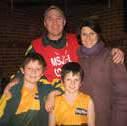
Andrew Bantock | 1983
I am fortunate to be happy and healthy, living not too far from Scotch with my wife Maria. My two sons, Harry (OSC 2014) and Austin (OSC 2017), have some great friendships from their time at Scotch.
My dad, Don (OSC 1950), turned 90 this year. We try to attend most Foundation Day dinners together with my brother Don (OSC 1979) and my sons. A special part of dad‘s birthday was his best mate Bob Anderson attending our celebratory dinner – they met 77 years ago on their first day of Scotch!
Garrett Prendiville | 2003
20 years just like that! I left the College, studied Commerce, travelled extensively, had a short stint at Ernst & Young and a longer stint at a boutique hospitality consultancy firm before moving to Sydney with my now wife Caitlin.
At EVT Limited I travelled extensively from Sydney in Australia and overseas visiting and working on hotels in the QT, Art Series and Rydges Hotel & Resorts portfolios. I oversaw capital expenditure due diligence and financial modelling along with

Denver Qauntrill | 2016
After graduating from Scotch in 2016, I completed my undergraduate degrees in Commerce and Biomedical Science at The University of Notre Dame in Fremantle, which afforded me opportunities to study in cities around the world including London, Boston, Phnom Penh, and Broome.
During this time, I stayed involved with the school as a member of the OSC Committee, coaching rowing and rugby, tutoring WACE students, working
A couple of years ago, at 75, I sold the business to retire. I remain involved with the OSC as a committee member and enjoyed organising our 60-year reunion earlier this year!
I’m now Managing Director of a medicinal cannabis company called Levin Health

In 1990, I married Debra and we have 4 sons –William, Angus, Hamish and Andrew who all share my love of golf. Last year, we played the inaugural Brayshaw Golf Challenge in Mandurah with 1983 OSC leavers (Devenish, Ledger and Salotti). We came 4th in a field of 4 but will suit up again in November.
After leaving school, I became a Chartered Accountant and then moved on to executive and board roles in the mining sector. I also gained some experience in infrastructure. Over the past 10 years I have gone back to advisory services.
Maria and I married in Greece five years ago. Among the guests were 17 OSCs, 11 being 1983 leavers. We are lucky to have maintained that special bond.
project management.
I became a fellow of the Court of Master Sommeliers and an Alumni of Cornell University in New York State in 2012 before moving back to Perth at the peak of the WA mining boom to help expand our family business (Prendiville Group).
My wife and I welcomed our son Zander in 2018 and daughter Luella in 2020. These days we are all about parks, pool and play (and reunions!).
in community service, and mentoring at the Scotch boarding house with the senior schoolboys. In 2021, I spent a short stint working in insolvency and restructuring accounting with McGrathNicol before returning to The University of Notre Dame to study Medicine in 2022, where I am now in my second year and hope to graduate in 2025.
What have they been up to?
Old Scotch Collegians 45
PETER PLAISTED (OSC 1963)
Peter Plaisted donated a significant collection of original photographs, newspaper clippings and programme booklets from the late 1950s to leaving year 1963. Themes featuring the 1958 Year 7 Football Team XVIII, 1963 Football Team XVIII and 1960 Cadets taking part in ANZAC day commemorations. Well executed compositional photographs frame place and time. 1963 newspaper clippings from the West Australian newspaper confirm the great Athletics win for the Public Schools Association Scotch Team five years in succession; as well as highlighting student voices for fundraising drive ‘Save The Children Foundation’.
Peter gifted photographs belonging to his father Sydney Anzac Plaisted (OSC 1933) and Uncle Warwick Turner Plaisted (OSC 1930) including 1930-1931 Football Team Eighteen XVIII, 1930s Students with shield and 1930s Athletics Team.
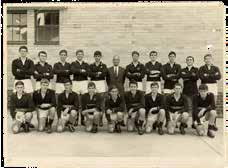
SIMON CARLIN (OSC 1980)
Simon Carlin donated a landscape painting by Ron Russell depicting a 2016 cricket match between Scotch College and Guildford Grammar. The view looks towards the Gooch on a hot summer afternoon. Simon was gifted the painting by Ron’s daughter Julie, with the work originally exhibited at Monet Gallery of Fine Art.
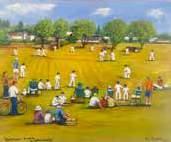
NED AUTY (OSC 1963)
Ned Auty (OSC 1963) donated a superb suite of photographs boarding days commencing Year 7 1959. The collection sums-up the general sentiment of school life and what it was to be a Boarder in the 1960s. Formal Cadet Officer Parades, students lining up on the fence line of the Top Oval, Quad, Pipe Band, events held at the Gooch, moments with Headmaster Dr G. Maxwell Keys and the annual Keys House Boarding display at Memorial Hall feature.
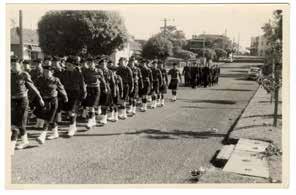

DOUGLAS BRENKELEY
Douglas Brenkely donated a book he authored titled ‘RAAF Historical Record of No 4 Service Flying Training School Geraldton’ published in 2022; a welcomed addition to the schools’ antiquarian book collection specialising largely in war-time historical editions.
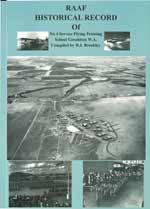

Douglas researched the book after the realisation that many generations might not be aware of the intense activity that took part at Geraldton airport during WWII relating to Australia’s commitment to the Empire Air Training Scheme. “Australia agreed to supply 36% of the total 28,000 aircrew drawn from the Dominions over the three years, this meant when the scheme was fully operational Australia would supply 432 pilots, 226 observers, 392 wireless operator-air gunners every four weeks for RAF service. This became the Empire Training Scheme.
During the years prior to WWII the Royal Air Force was becoming concerned that the RAF may not be able to sustain many losses of air of air crews envisaged on any likely conflict with Germany. This fact was brought home in no uncertain terms as RAF bomber losses mounted during the first two years of WWII and continued for considerable time after.
ALEXANDER O’CONNELL WILLIAM AUGUST GOLAND
Alexander O’Connell contributed additional historical photographs and postcards supporting prior archival donations. A suite of photographs feature his grandfather William August “Bill” Goland. “Bill” as he was fondly remembered was a former teacher, coach and rowing enthusiast. The very early images date from 1911 and feature Bill socialising with collegiates Headmaster Peter Corsar Anderson, portraits in World War Two military uniform, 1920s photographs of the Public Schools Association Head of the River Rowing Crew Four IV in the school garden and early portraits of him as a young man.
Archives
Clockwise: 1960 ANZAC day Cadets marching Bayview Terrace Claremont; 2023 RAAF historical record of No 4 Service Flying Training School Geradlton W.A; 2016 Ron Russell painting depicting Cricket match Scotch College versus Guildford Grammar School; 1961–1963 circa Scotch College Cadet Parade at the Playing Fields; 1963 Second Football Team XVIII.
KATHERINE GAJDATSY
Katherine Gajdatsy donated items belonging to her uncle David George Lovell Hedge (OSC 1954), relative of Alexander Gajdatsy (OSC 2016) and Nikolas Gajdatsy (OSC 2020). The donation includes memorabilia from David’s time at school including a 1950 enrolment acceptance letter from Headmaster Dr G. Maxwell Keys and Scotch College W.A. Charges booklet dated 1.1.1950 outlining fees, concessions, deposit, extra subjects and text book requirements.
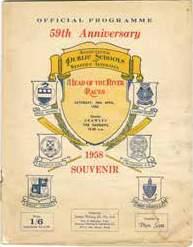
DEBBIE BAYFORD
Debbie Bayford donated two original book editions titled ‘Ungava A Tale of Esquimau Land’ published in 1906 by Robert Ballantyne; awarded to Alexander Sedwich (OSC 1908) Debbies maternal grandfather for Boarding Wool Class Form 2 signed by Headmaster P. C. Anderson in December 1907. Included the edition ‘Havelock the Dane – A legend of Old Grimsby and Lincoln’ published in 1899 by Charles Whistler was awarded in December speech night in 1907 for Arithmatic.
COLIN SHARP (OSC 1951)
Colin Sharp donated a vast collection from his time at school along with items belonging to his father Cyril Sharp (OSC 1914). Two of Cyril’s blazers were donated featuring gold
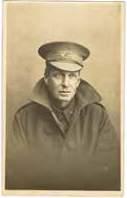
striped braid. Seven 1946-1976 Reporter editions, 1948-1950 P.S.A. Athletics carnival Programmes, 1948-1952 Public Schools Association. Head of the River Programmes, 1947 and 1948 staff photographs, 1950s Arts and Crafts exhibition invitation and 1997 centenary dinner memorabilia – invitation, menu, entry ticket and The West Australian newspaper clipping showcasing the event.
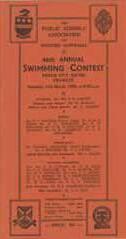
ALEXANDER THOM (OSC 2023)
Alexander Thom, Vice-Captain of Boats 2023, generously donated an official 1958 59th Anniversary Public Schools Association rowing programme originally belonging to his grandfather David Thom (OSC 1957). Alexander rowed two seat in the first VIII 2022 and his grandfather rowed bow seat in the winning first VIII 1957 Head of the River race featured in the programme for the previous year. The sentimental donation connects Alexander to the Thoms generational commitment to the Scotch College Boat Club.
BRADLEY MCMEIKAN (OSC 1976)
Bradley Mc Meikan donated his grandfather William Roy Bishop Mc Meikan’s (OSC 1915) framed ‘1915 Rowing Crew VIII Winners’ photograph. The black and white image housed in hand carved frame relates to the former donation of William’s Oar from the winning first crew.
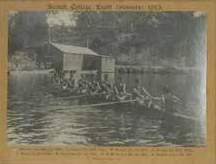
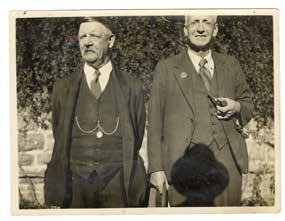
BILL ROCK (OSC 1963)
Bill Rock donated a telegram and letter dated 9th December 1958 from Headmaster Maxwell Keys to his father William Rock congratulating him on Bill winning the Scotch College entrance Scholarship. The letter states “Bill did very well in both tests and in the interview and congratulating him on coming to Scotch” Dr Keys 1958. The value of the scholarship at the time was 55 pounds 10 shillings per year for five years.

GRAHAM WEIR (OSC 1958)
Graham Weir donated a sketch of the Scotch College Pipe Band by talented cartoonist Dean Alston gifted by his father Michael whom worked with Dean. Graham coincidentally performed as a Pipe Major in the school band during his time at Scotch.
CARY DRY (OSC 1977)
Cary Dry attended school from 1973 and donated a 1944 Cadet Portrait of Mervyn Matthews (OSC 1946) in full Cadet Regalia. The photograph would have most probably belonged to Cary’s father Barry Dry (OSC 1951). Cary donated Reporter editions from 1970 - 1977.
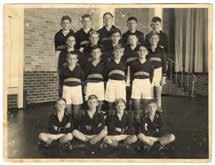
Archives 47
Clockwise: 1958 Year 7 First Football Team XVIII; 1915 Scotch College VIII Winners; 1939 circa William “Bill” Goland in WW2 uniform; 1958 PSA Head of the River Programme; 1950 11th March Public Schools Association Annual Swimming Contest Perth City Baths; 1930s circa Mr B. Anderson left and Mr Bill Goland right.
THE MORAN FAMILY
The Moran family donated two photographic postcards belonging to their maternal relative, Edwin “Ted” Huck (OSC 1914) OAM BA.
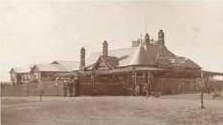
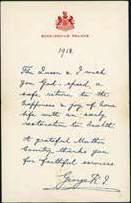
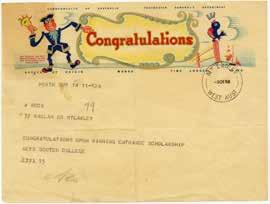

Edwin commenced schooling as a day boy in 1910, volunteering in WW1 shortly after his Year 12 leaving year, 1914. He enlisted on the 27th September 1915 at 18 years and 6 months of age. He was placed in the 28th Battalion, trained at Blackboy Hill, embarked from Fremantle on the ‘Borda’ in January 1916, and fought on the Western Front. He was wounded in action three separate times, with a gunshot wound to the right shoulder and to the left leg in 2016, followed by what the telegram to his family stated as a “gunshot wound face fractured jaw severe” in 1918. This would result in his being an early recipient of reconstructive plastic facial surgery. Whilst recuperating in hospital, he was visited by King George V and Queen Mary, who spoke genuinely with him about his surgery. A letter from Buckingham Palace shortly followed: “The Queen and I wish you God-speed, a safe return to the happiness and joy of home life with an early restoration to health. A grateful Mother Country thanks you for faithful services. George R.V.” 1918.
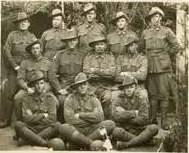
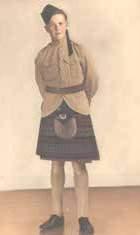
The postcard features twelve servicemen on discharge from Wareham Hospital, Dorset, with Edwin seated centre left, middle row. His handwritten note on the reverse states, “This little lot were taken in Wareham – 9 South Australians, 1 NSW, 1 Victorian and 1 Groper; all wounded in the great war – ahem! A square dinkum photo nobody looks too angelic, from Eddie…” Ted Huck 1918.
Post-war, Edwin always referred to himself as Ted. He had a long and distinguished career as a teacher and Headmaster, and in 1964 came out of retirement, returning to Scotch College to teach history on occasion.
Ted received an OAM, a Medal of the Order of Australia, on 26th January 1979, in recognition of his service to education. The presentation was made by King Charles III, then Prince of Wales, to whom, breaking with protocol, Ted retold the story of his meeting with Charles’s great grandfather, King George V, which delighted and amused them both.
The second postcard features Collegians House circa 1910. The card was posted to Ted’s brother, Charlie Huck, during his first years at school.
Ted is survived by his great grandsons who attended the College; Nicholas Moran (OSC 2007) and Sebastian Moran (OSC 2010).
DAVID MATTHEWS (OSC 1984)
David Matthews has donated a magnificent Oar that rowed to win the 1984 Public Schools Association Head of the River race. The Oar features hand painted crew names, positions and weights. The First VIII won the race in record time and a significant occasion as it was the very last time the HOR was held on the ‘Narrows Course’ passing The Old Swan Brewery.
JOHN HILL (OSC 1990)
John Hill donated two reporter editions and a Record book that features his 1990 cohorts peer leaving signatures.

CAMERON NEWHAM (OSC 1983)
Cameron Newham authoured two books which he personally delivered to school on a recent stint home from the United Kingdom. ‘Country Church Monuments’ published in 2023 by Particular Books London with exquisite photographic images illustrates “the history of rural church monuments and forgotten national treasures of England and Wales” Newham 2023. ‘Learning to Bash Shell’ published by O’Reilly media will be housed in the Archival Reading Room library.
Clockwise: 1958 Bill Rock (OSC 1963) Entrance scholarship Telegram; 1918 “This Little Lot” postcard reverse scribed by Edwin “Ted” Huck (OSC 1914) at time of discharge from Wareham Hospital Dorset England; Prior archival donation 1918 King George V letter addressed to Edwin “Ted” Huck (OSC 1914); 1910 postcard of Collegians House taken by Edwin “Ted” Huck (OSC 1914) posted to his brother Charlie; 1944 circa Cadet Officer Mervyn Matthews (OSC 1946); 1918 “This Little Lot” postcard featuring twelve Australian servicemen on discharge from Wareham Hospital, Dorset, England featuring Edwin “Ted” Huck (OSC 1914) OAM BA seated central left middle row.
The Alexander Society: Built upon a culture of giving
Mr David Kyle Director of Admissions and Advancement
Over the course of Headmaster Dr Alec O’Connell’s tenure, the story of Jane Alexander has become embedded in the psyche of the College community.
Dr O’Connell regularly reminds us of the foresight and generosity of the Alexander family, born from the philanthropic and can-do spirit of Jane, whose £500 led to the establishment of Scotch College more than 125 years ago.
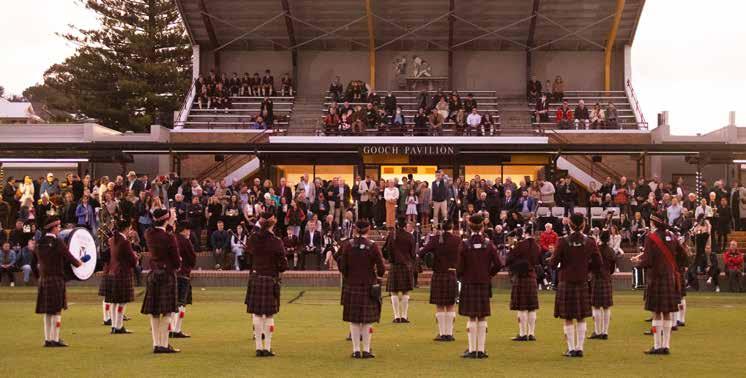
As any strong leader, particularly in an educational setting, will tell you, stories are the avenue by which we transfer culture, and the stories that a community celebrate say a lot about what they value and who they are. In our case, the fact that the wife of the Honourable William Alexander MLC was the driving force behind our College is not surprising, and perhaps not a particular cause for celebration, but the fact that Dr O’Connell has embedded this into our
psyche as the birth of our College and our philanthropic spirit is an indication of our values and spirit.
It is this family whose name we honour around the school and as the name of our bequest programme, The Alexander Society. The bequest programme commenced in 1988 and in November 1998 the College Council formally approved the naming of The Alexander Society to be led by Mr David Broadfoot (OSC 1963). The aim of the Society is to honour and formally recognise the generosity of the community who have indicated their intention to contribute to Scotch College as a part of their charitable giving in their will. The Alexander Society members maintain a close connection with Scotch, and it is our intention to initiate more events and opportunities to develop these relationships across the whole school community. We are also looking to ensure we continue to celebrate and honour the Alexander family and I hope to be able to tell you more about this in the later stages of this year.
Philanthropy and the Scotch Foundation has established Scotch as one of Australia’s leading schools and without this generosity we would not be the community we all value. The generosity of our community has ensured we have developed teaching and learning facilities to rival any school in the world. Furthermore, we are increasingly able to offer opportunities to students who otherwise would not be able to attend the College, ensuring we maintain our egalitarian
traditions and foster a community that best prepares our students for life.
There are copious examples of the generosity of our community investing in the future of the College and its students and a couple of those examples, can be seen on the next page. In the case of the Wishaw bequest, I have been fortunate enough to accompany students on these community-based service trips and see first-hand the impact such an opportunity has provided. I also think that the thoughts of Ross Stanley Bourne (OSC 1949) should be at the forefront of our minds when considering giving. As Ross alluded to, the opportunity to attend or be associated with a community such as Scotch is an absolute privilege and provides a lifetime of opportunities. Knowing that this gift can be passed on to future generations can provide great comfort and joy.
The Alexander Society welcomes anyone who confirms such a bequest, regardless of the financial commitment, and the College is well placed to assist anyone looking to do so. While we certainly aim to celebrate bequest donors as a part of The Alexander Society, we also welcome and respect bequests made anonymously.
The seed, sown by Jane and leading to the enrolment of her son Douglas, our first student, has now grown to be one of Australia’s most respected schools and philanthropy will be a key part of its future. Please get in touch if you’d like to learn more.
Philanthropy Philanthropy 49
Donor Profiles
THE BEVERLEY WISHAW BEQUEST
Beverley Wishaw had a lifelong association with the College. As a Presbyterian Ladies’ College student, Bev enjoyed socialising with Scotch boys at dance classes and school balls.
Her brothers Terry (OSC 1949), Ian (OSC 1959) and Bruce Palmer (OSC 1961) all attended the College, and in the early 1960s Bev and her husband Len moved to Claremont to be close to Scotch and PLC, where their three daughters, Jane, Didie and Suzie were pupils.
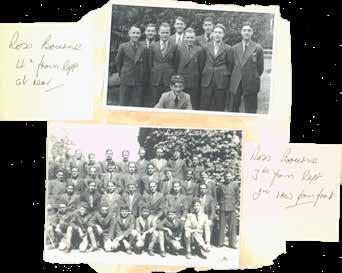
Her son Peter Wishaw (OSC 1979) and grandsons Michael (OSC 2009) and Robert Debenham (OSC 2012) attended Scotch College. As President of the Speech and Hearing Centre in 1979, Bev had great compassion, empathy and understanding towards others, especially those less fortunate. Fittingly, due to her bequest, the Beverly Wishaw Award has enabled a Senior School student nominated by the Academic Support Department, to attend one of our community-based service trips.
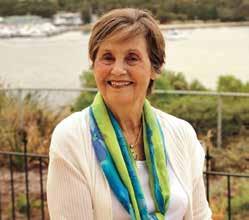
The recipients have been able to connect with fellow students, united in a desire to contribute to the lives of others throughout the world.
ROSS STANLEY BOURNE (OSC 1949)
Ross joined the Alexander Society in 2001, formerly a Chartered Accountant with Bird Cameron and for many years Commodore of Royal Freshwater Bay and a member of Lake Karrinyup Golf Club. While sport was his passion the lynchpin in Ross’s life was Scotch College.
Such was his love of Scotch that Ross’s contemporaries during informal lunches would chant the school war cry with Ross taking the lead to ensure that a robust rendition ensued.
Enrolled at Scotch in 1945, his education shaped him into the “Gentle Man” he would become. Ross was awarded colours for lifesaving, book prizes by P.C Anderson and matriculated in 1949. He had a strong friendship with Gil Brinsden and the Prendiville family who helped shape his thoughts to leave a lasting legacy to Scotch in the form of a bequest.
When Ross joined the Alexander Society he was already a firm supporter of Scotch pledging support for the then “new” Keys Boarding House. His thoughts on the Alexander Society were that it had given him in his lifetime a special opportunity to leave a meaningful legacy and the knowledge that his gift would continue in perpetuity to assist generations of Scotch boys.


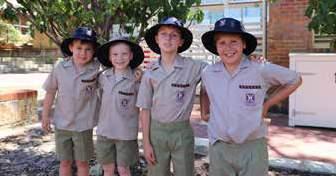



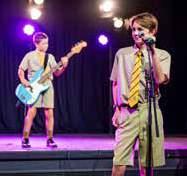
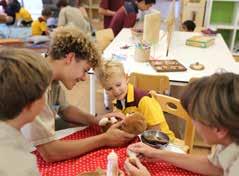
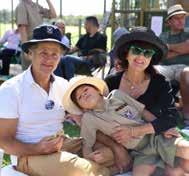
Follow us on social media as we share what’s happening inside and outside the classroom. Make sure to tag us, and we’ll reshare your photos when we can. You can also email your great Scotch snaps and captions to marketing@scotch.wa.edu.au or text +61 417 634 741. Find us at: ScotchCollegeWA @scotchcollegeperth @scotchcollegeperth Scotch College, Perth
Follow life at Scotch


76 Shenton Road Swanbourne WA 6010 CRICOS Provider Code 00449M www.scotch.wa.edu.au mail@scotch.wa.edu.au +61 8 9383 6800

















































 Mrs Cara Fugill Head
Mrs Cara Fugill Head



 Mrs Racquel Cumming Kindergarten Teacher ELC Coordinator
Mrs Racquel Cumming Kindergarten Teacher ELC Coordinator

 Top: Tom and Will Della Vedova reflecting on our class’s learning about dinosaurs.
Top: Tom and Will Della Vedova reflecting on our class’s learning about dinosaurs.
 Mr Brad Gill Head of
Mr Brad Gill Head of

 Thomas Gaitatzis
Thomas Gaitatzis









 Tom Jackson Year 12
Tom Jackson Year 12








 Ethan Buzza Year 11
Ethan Buzza with Perth Mayor Basil Zempilas at The Young Entrepreneurs Showcase.
Ethan Buzza Year 11
Ethan Buzza with Perth Mayor Basil Zempilas at The Young Entrepreneurs Showcase.












 Clockwise: Year 8s at the Community Project Launch; Harry Jones shaves his head for a good cause; James Walaski (Year 7) with parents Ben and Fiona and Dr Alec O’Connell, Headmaster.
Clockwise: Year 8s at the Community Project Launch; Harry Jones shaves his head for a good cause; James Walaski (Year 7) with parents Ben and Fiona and Dr Alec O’Connell, Headmaster.














































 Clockwise: Guests networking at the Business Directory Launch; Tim Bunney (OSC 2005), Garrett Prendiville (OSC 2003), Aaron McDonald (OSC 1981) and Richard Young (OSC 1982)
Clockwise: Guests networking at the Business Directory Launch; Tim Bunney (OSC 2005), Garrett Prendiville (OSC 2003), Aaron McDonald (OSC 1981) and Richard Young (OSC 1982)












 The Old Scotch Collegians held the St Andrew’s Day Vale Service in the Scotch College Chapel on 30 November, followed by morning tea in the Memo Hall Foyer.
Attendees at the service in The Chapel.
The Old Scotch Collegians held the St Andrew’s Day Vale Service in the Scotch College Chapel on 30 November, followed by morning tea in the Memo Hall Foyer.
Attendees at the service in The Chapel.






 Top right: Ian Urquhart, Ross Campbell, Clive Tonkin, Peter Edwards and Bob Grieve.
Above: Geoff Morgan, John Foster, Michael Branson.
Right: Geoff Morgan (Seated) and Peter Silinger.
Top left: Alex Gordon (OSC 2008), Tom Ledger (OSC 2009), Michael Denny (OSC 2008), Andrew Bartlett (OSC 2010), Andrew Moullin (OSC 1997).
Above: David Kyle and Mark Paganin with students.
Top right: Ian Urquhart, Ross Campbell, Clive Tonkin, Peter Edwards and Bob Grieve.
Above: Geoff Morgan, John Foster, Michael Branson.
Right: Geoff Morgan (Seated) and Peter Silinger.
Top left: Alex Gordon (OSC 2008), Tom Ledger (OSC 2009), Michael Denny (OSC 2008), Andrew Bartlett (OSC 2010), Andrew Moullin (OSC 1997).
Above: David Kyle and Mark Paganin with students.








































































